2022: A Year of Reconnection and Challenges
COVID, inflation and staffing shortages were just a few of the stories that made headlines in healthcare this year.


COVID, inflation and staffing shortages were just a few of the stories that made headlines in healthcare this year.



One day you wake up and you realize 27 years have passed. You’ve been blessed to be in an industry that changes lives, saves lives, builds amazing relationships, and gives you so much gratification. When I think about December’s issue each year the first thought is always “A Year in Review,” because that is typically the theme of the book. Which it is this year as well, but this year it hit me that for my life there are 27 years in review. What a gift!
From the minute Bill Riddell hired me at Healthlink, all the way to being the publisher of Repertoire Magazine, it has been one hell of a ride. I wouldn’t change anything in my career. All the ride days selling lotions and potions with distribution reps, to demoing gloves for an OR nurse, to calling on ABCO members across the U.S., can only be described as a gift.
As we all go through the holiday season this year, take some time to reflect on the gift of being in the med/surg industry. You get to sell prod ucts that may prevent someone from going blind, or diagnose them for flu, or outfit an entire new physician office from the ground up. Reflect on the relationships you have formed with your manufacture partners, your team mates, and your caregivers.
As nerdy as it may sound, what we do isn’t a job – it’s a gift in the form of a career. I am forever grateful for the friends I have made over the years, who I will carry with me throughout my life. I am also grateful for Repertoire Magazine and the joy it provides me in helping bring manufacturers and distributors together each month. The magazine will turn 30 in 2023. Thank you Chris Kelly and Brian Taylor for putting it all on the line back in 1993 and founding this amazing publication. It is my honor to continue the legacy you two started.
As we close out the year, we would like to say thank you to the greatest industry on the planet. Happy holidays, and we will see you in the new year with the brand new RepConnect, built to connect distributor reps and manu facturers through timely, compelling content.
Dedicated to the Industry, R. Scott Adams
editor Mark Thill mthill@sharemovingmedia.com managing editor Graham Garrison ggarrison@sharemovingmedia.com
editor-in-chief, Dail-eNews Pete Mercer pmercer@sharemovingmedia.com art director Brent Cashman bcashman@sharemovingmedia.com circulation Laura Gantert lgantert@sharemovingmedia.com sales executive Amy Cochran acochran@sharemovingmedia.com (800) 536.5312 x5279
publisher Scott Adams sadams@sharemovingmedia.com (800) 536.5312 x5256 founder Brian Taylor btaylor@sharemovingmedia.com

www.repertoiremag.com/subscribe or (800) 536-5312 x5259
Repertoire is published monthly by Share Moving Media 1735 N. Brown Rd., Suite 140, Lawrenceville, GA 30043 Phone: (800) 536-5312, FAX: (770) 709-5432; e-mail: info@sharemovingmedia.com; www.sharemovingmedia.com





























How we can really make a major impact on the U.S. healthcare system and the health of millions with diabetes.
For any number of reasons, since the COVID pandemic began, most of us wish we could either set the clock back to 2018 or that we had a magic wand and just ONE wish we could make come true.
The effects of the COVID pandemic make this especially true of patient health and the impact on life expectancy and the leading causes of death in the U.S. Both have had disturbing trends. Life expectancy is down sharply, and the leading causes of death are on the rise after many years of declines for most of them.
 By Jim Poggi
By Jim Poggi
Let us take a closer look. Up until 2019, the U.S. healthcare system was experiencing signifi cant decreases in the morbidity and mortality associated with the 10 leading causes of death. As I have reported before, most of the 10 leading causes of death declined noticeably up to 2019. Cancer and heart disease dropped significantly. Stroke and influenza also dropped, and it looked like we were in rather decent shape overall. Life expectancy was up to 78.8 years in 2019, but it slipped to 77.3 years in 2020. The decline of 1.5 years was the largest decline since World War II.

So, what happened? As in so many cases of healthcare issues, COVID happened. It resulted in over 1 million deaths in the U.S. and shined a light on the most vulnerable populations and the comorbidities most likely to be associ ated with serious illness and death from COVID. Minorities, the elderly, and those with existing comorbidi ties fared the worst. Diabetes was the leading comorbidity to corre late with mortality from COVID. Four out of 10 COVID-related deaths were associated with patients having diabetes.
What does this have to do with the magic wand situation? While we do not yet know to what extent the respiratory season ahead of us will see a resurgence of COVID, that is not where the magic wand can make the most difference. In this column I plan to encourage you to wave the magic wand over diabe tes to see how we can really make a major impact on the U.S. healthcare system and the health of millions. As you will see, diabetes is a factor not just for COVID but for many of the 10 leading causes of death in the U.S. But, between changes in lifestyle and
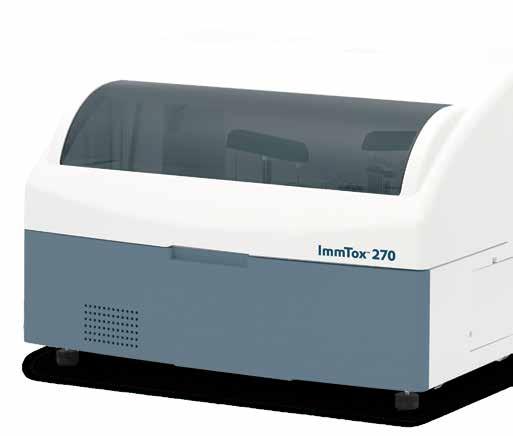
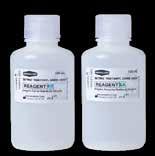

newer medications, there is hope that we are beginning to turn the corner on management of diabetes, particu larly type 2 diabetes.
What do the numbers show related to diabetes?
Before COVID swooped in and grabbed the No. 7 slot on the top 10 causes of morbidity and mortal ity, diabetes was No. 7. In the 2020 data, diabetes dropped to No. 8 solely due to the intrusion of COVID in the statistics.
(which has been behind the cur tain since the pandemic began) is up 5.7% and diabetes is up 14.8%, according to the National Center for Health Statistics.
As a result of these statistics, a reduction in the incidence of diabe tes, as well as better glycemic con trol, can have a powerful positive impact on the 10 leading causes of morbidity and mortality, leading to longer, healthier, and more produc tive lives. Responsibly managed, and in the absence of a new pandemic,
Diabetes is associated with several of the other leading causes of death, including COVID, heart disease, kidney disease and stroke. Diabetes and its comorbidities represent over 47.3% of all causes of death in the U.S.
How do changes in diabetes treatment and management influ ence the overall U.S. death rate, and what can we in the med/surg indus try do about it? The magic wand impact can and will help in two ways. First, diabetes is associated with sev eral of the other leading causes of death, including COVID, heart dis ease, kidney disease and stroke. Dia betes and its comorbidities represent over 47.3% of all causes of death in the U.S.
Secondly, the pandemic has reversed long-standing trends of reductions in morbidity and mortal ity and shows the disturbing impact the COVID pandemic had. As dis turbing as it may be, most morbidi ties and mortalities have increased in that time, reversing long-stand ing trends. Heart disease is up 4.1%, stroke is up 4.9%. Influenza
improving the care and management of diabetes may well improve life expectancy in the U.S.
So, this is where the rubber meets the road. We have all the diagnos tic and care management lab tools your customers could ask for. Most of the tests are also waived, which is another benefit for you and your customers. From routine urinaly sis to glucose testing in office and at home, A1C, microalbumin and kidney function tests, we cover the essential diabetes tests, and we are taking advantage of newer technol ogy like continuous glucose moni toring and connectivity solutions.
You also cover cardiac, coagu lation and other tests important to manage comorbidities associated
with diabetes. In short, you and your key lab manufacturers can cover the gamut of clinical conditions nega tively impacted in the past three years.
What is the customer story, you ask? Simple, ask them the one cry ing need they must meet to improve patient care overall from a disease state perspective. I will be surprised if diabetes is not their primary con cern and unmet need. Then share the data you have seen and offer your help and consultation to help them deliver the medical-surgical and laboratory products they need to be effective.
If I had a territory, I would even go one step further and ask what sorts of patient education and sup port they are offering (particularly for the larger practices). I am willing to bet they will point you to the lit erature they can and sometimes do make available. These days, this is simply not enough. With the popu larity of virtual visits and dramatic improvements in virtual platforms, I would challenge whether they would consider setting up a virtual diabetic patient group and offering education and support. This sort of value-added program can help grow your business and make a positive impact on the health of your com munity. While it takes a commit ment to time and resources from your customer it can really set your key customers apart from others. And it gives you and your key lab suppliers additional opportunities to share your knowledge.
There is a significant need to return the U.S. population to a better state of overall health, and improvements in diabetic care can be a gateway to success for you and your key customers. Your active consultation in this area can make a difference.
Quickly detect and differentiate between Influenza and COVID-19 * with a single test this flu season, with clear, trusted, digital results in 15 minutes.

See what’s new at BDVeritor.com/COVID-Flu
*Emergency Use Authorization Information for the SARS-CoV-2 and SARS-CoV-2 & Flu A+B assays:
• These products have not been FDA cleared or approved; but have been authorized by FDA under EUA for use by authorized laboratories





• The BD Veritor™ System for Rapid Detection of SARS-CoV-2 has been authorized only for the detection of proteins from SARS-CoV-2, not for any other viruses or pathogens; the BD Veritor™ System for Rapid Detection of SARS-CoV-2 & Flu A+B has been authorized only for the detection of proteins from SARS-CoV-2, influenza A and influenza B, not for any other viruses or pathogens; and,
• These products are only authorized for the duration of the declaration that circumstances exist justifying the authorization of emergency use of in vitro diagnostics for detection and/or diagnosis of COVID-19 under Section 564(b)(1) of the Federal Food, Drug and Cosmetic Act, 21 U.S.C. § 360bbb-3(b)(1), unless the declaration is terminated or authorization is revoked sooner.
BD Life Sciences, 7 Loveton Circle, Sparks, MD 21152-0999 USA 800-638-8663
BD, the BD Logo and Veritor are trademarks of Becton, Dickinson and Company or its affiliates. © 2021 BD. All rights reserved.
Dennis Clock, recipient of this year’s John Sasen Award, continues to advocate for the med/surg industry.
Dennis Clock got an early start in the med/surg industry, watching how his father and mother owned and operated an independent distribution business. One of his father’s key tenants was contributing to industry efforts in govern ment policy, and the overall collaborative efforts among healthcare stakeholders.

“You put in the time because that’s the right thing to do, and you do it because it helps strengthen the industry that you’re in,” said Den nis Clock, president and owner of Clock Medical Supply. The Health Industry Distributors Association (HIDA) named Clock the recipient of the 2022 John F. Sasen Leader ship Award. The Sasen Award recog nizes individuals who demonstrate exceptional leadership, commitment, and service to the healthcare prod ucts distribution industry and HIDA.
Clock served two years on the HIDA Board of Directors, from 2012 to 2014. Previously, he chaired the Post-Acute Advisory Coun cil. He is currently a member of HIDA’s policy-focused Advocacy Council, AMS Sales Training Users Group, and Independent Distribu tors Leadership Council.
Clock shared with Repertoire what it meant to receive the award, industry initiatives he’s proud of par ticipating in, and what 2022 has been like as an independent distributor.
Repertoire: What did it mean for you to receive the John Sasen award?
Dennis Clock: It has been quite humbling, honestly. I believe my dad deserves the recognition. He was the leader of this company and brought me into HIDA. He actually stepped back from his role, and let me step in at a very young age, and it’s been 25 years since then.
Having grown up in a family business, and listening to my dad tell stories about HIDA and his involve ment, I started working with HIDA in the late 90s. You put in the time because that’s the right thing to do, and you do it because it helps strengthen the industry that you’re in. You want to have a voice in
government affairs, you want to have a voice in relationships between manufacturers and distributors, and then you want to understand policy.
So it’s always been important to promote HIDA and its efforts, because for a small company like ours, it’s important to have an outsized voice. HIDA allows us to punch above our weight class. Hav ing the opportunity to talk with peers and with folks in the industry that I hadn’t met before is the real joy.
was just the perfect example of servant leadership. That’s where I believe the award comes from, and what I strive to do. So that’s why I feel honored by receiving this particular award.
Repertoire: In your work at an industry level, what are some initiatives that you’re proud to have participated in?
Clock: I think of three things I would probably draw the most attention
When I first joined with HIDA, we had one government affairs person, who was also our representative on the Hill. Now we have a team, we do a fly in, and we advocate for things that our industry needs from the government. Since 70% of healthcare funding comes from the government in one form or another, it’s extremely important to do that.
It also means quite a bit to receive the award because I was very fortunate to get to know John through my activities on the board of HIDA, and spend some time with him here and there. He always went out of his way to make people feel valued, no matter what their role was in the organization that they represented. Generally, every conversation I had with him was an honest one-on-one, and he was only focused on you in the conversation, which is rare. Most people are distracted these days with their cell phones and their dif ferent things, but John was look ing you right in the eye and hear ing what you had to say, then he would remember it later on. John
to. The first one is HIDA’s policy role and the growth of our government affairs team. When I first joined with HIDA, we had one government affairs person, who was also our representative on the Hill. Now we have a team, we do a fly in, and we advocate for things that our industry needs from the government. Since 70% of healthcare funding comes from the government in one form or another, it’s extremely important to do that.
The second would be our ability to deal directly with the bureaucracy of CMS on competitive bidding. My company also does Medicare Part B billing, so we’ve been very involved with Medicare, trying to get them to understand that what they created
as a competitive bidding program isn’t working and won’t work. That’s why the last bid failed miserably. The bid failed because it is not a true market bid that allows prices to fall and rise, CMS only will allow it to fall and unfortunately it’s having repercussions downstream.
The third thing was to get an independent distributor advisory council together. There were coun cils around the different segments that HIDA represents, such as an acute care council, physician care council, lab council, but there wasn’t anything focused specifically on independent distributors, and the small business focus of those dis tributors. We created that council, and it’s one of the big introductory councils that people can join. We have cross-market folks coming in, and we’re talking about topics that are common to small businesses –workman’s comp insurance, health insurance, how we do payroll, what systems we run, how we encourage employee retention, etc. It’s been a successful group.
Repertoire: As an independent distributor, what has this year been like?
Clock: I think like most small busi nesses, distributors are naturally between a rock and a hard place. You have the manufacturers that con trol the pricing. They have their own problems and issues. Raw materi als have continued to increase, other costs continue to increase, and they’re having to pass those along to us.
We’re then attempting to pass the increases along to an industry that is mostly reimbursement con trolled, and that reimbursement is not factored to inflation. So, in an inflationary environment, prescrip tive fee-for-service billing does not
reimbursement rate environment, we’ve got a difficult time on our hands. This is all happening five years before the boomers start turn ing 80. And 80 is the beginning of the prime age for people to start entering into long-term care.

If I can use my voice in any way, it’s to recognize that the distribu tion community is out here allowing patients to live where they want to live, because we’re the mechanism through which the products get to patients in the appropriate amount, manner, and time. And in coordi nation with our billing partners,
We’re then attempting to pass the increases along to an industry that is mostly reimbursement controlled, and that reimbursement is not factored to inflation.
So, in an inflationary environment, prescriptive fee-for-service billing does not work. They’re not getting reimbursed enough to cover the cost of doing those courses of business, and they’re relying on pandemic money or reserves effectively still to this day, trying to pay those bills.
work. They’re not getting reim bursed enough to cover the cost of doing those courses of business, and they’re relying on pandemic money or reserves effectively still to this day, trying to pay those bills. They’ve shrunk considerably in size because of staffing issues. And so in between those two forces where prices are rising, labor is a continu ous issue, and on the other side we’re having to push through those price increases, our laborer diffi culties, our problems, into a fixed
both in the DME, HME, and the plain distribution world and our customers, we get them there, and we get them paid for as best we can. That’s why it’s critical for us to strengthen the distribution system, at a time when we’re going to have the geriatric population of this country growing at an historic rate. We have to put government sup port behind the distributor com munity in healthcare to allow us to assist them in providing care to this burgeoning population.
Overlapping Clinical Characteristics of COVID-19, Influenza, and RSV
• Multiple pathogens causing similar symptoms are circulating at the same time and need to be tested simultaneously to obtain an accurate diagnosis


• Get accurate detection and differentiation of SARS-CoV-2, Flu A, Flu B, and RSV in 36 minutes or SARS-CoV-2 positive results in as soon as 25 minutes ^
• Actionable results from a single sample with less than one minute of hands-on time and easy-to-use workflow; enabling effective management of limited resources
* These products have not been FDA cleared or approved, but have been authorized by FDA under an EUA for use by authorized laboratories; Xpert Xpress CoV-2 plus has been authorized only for the detection of nucleic acid from SARS-CoV-2, not for any other viruses or pathogens; Xpert Xpress CoV-2/Flu/RSV plus has been authorized only for the simultaneous qualitative detection and differentiation of nucleic acids from SARS-CoV-2, influenza A, influenza B, and respiratory syncytial virus (RSV), and not for any other viruses or pathogens. The emergency use of these products is only authorized for the duration of the declaration that circumstances exist justifying the authorization of emergency use of in vitro diagnostics for detection and/or diagnosis of COVID-19 under Section 564(b)(1) of the Federal Food, Drug and Cosmetic Act, 21 U.S.C. § 360bbb-3(b)(1), unless the declaration is terminated or authorization is revoked sooner.
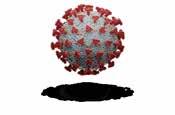
^ Full test runtime is 36 minutes. SARS-CoV-2 positive results available in as soon as 25 minutes with early assay termination.
1 Flu - https://www.cdc.gov/flu/symptoms/symptoms.htm


Whether it’s traditional med/surg offerings or something a little more unique, C&S Supply has positioned itself to meet almost any need of its customers.
 By Graham Garrison
By Graham Garrison
In the early 1980s, after working his way up the career ladder in the med/surg industry, Al Wicks found the place he wanted to settle down. He and his wife Linda had moved to Berks County for a job, and quickly fell in love with the area.
To say they put down roots would be an understatement. “Ever since I was a little kid, I always wanted to be an entrepreneur,” Wicks said. So that’s what he did. In 1982, he started C&S Supply Co. –named after his two children, Christy and Scott.
He’s been living out that dream ever since. In fact, the company recently celebrated its 40th anniversary.
More than typical Wicks started selling medical sup plies in 1965 for Hoffman Surgical Supply, which would eventually be
bought by General Medical. He then went to work for Murray Baumgart ner, which was owned by HealthCo in Maryland. HealthCo sold Mur ray Baumgartner to Foster Medical. During this period he never really changed jobs. “The companies just kept getting bought out,” he said.
Wicks then had the opportunity to move to Reading, Pennsylvania as a manager for a company called HealthCo Bellevue. Soon after, Wicks took the plunge in starting his own business. The distributor’s initial focus was serving clients anywhere within a 70-mile radius of Berks County. They called on physicians, nursing clinics, etc. Over the years, C&S Supply has diversified to offer services beyond a typical distributor. They provide medical/surgical sup plies, paper supplies, office supplies, furniture and even paper shredding services. “We’re able to take care of all the needs of individual doctors,” Wicks said. As healthcare providers have consolidated very heavily, and hospitals purchased a lot of practices in their area, C&S Supply is able to offer an array of services to custom ers of all sizes and specialties.”

When it comes to being a busi ness owner, Wicks said he loves being his own boss. While he turned 75 years old recently, he has no intentions of retiring. “I like get ting up in the morning, putting on a shirt and tie, going to work and being with the customers.”
Wicks has some accounts that are 30 to 35 years old. He still does tasks for some like individual inventories. “You get to know everybody in the building, and they come to you with different challenges.” Wicks can spot potential issues both small and large. For instance, if a client has a torn exam top, he can set up an appoint ment with one of C&S’s equipment specialists to fix it. “Every day I’m with customers, I’m trying to take their needs, make them my problem and solve things for them.”
The elder Wicks admits he is still “old school” in his approach. While the younger generation may prefer voicemail, text and email, Wicks said
he always tries to find a reason to talk to the customer. “I like to see them face to face. I want to read their body language. And most of them will open up to you with their long-term plans. You try to get in as early as you can with them.”
Wicks is not against texting, voicemail and email, because they’re essential to business and not going away. “But I have found that selling will always be about relationships,” he said. “You build relationships with people. The things that I like the best are when I get a referral from one customer to another. It can’t get any better than that. We are now, over the last two years, spend ing more money on marketing. But
when you get a referral from one customer to another, it’s the best that you can hope for.”
Indeed, the elder Wicks leaves the more tech-focused parts of com munication and business operations to his son Scott, the company’s vice president of sales & marketing. “He is a voicemail, text, email type per son.” Their styles complement each other, Wicks said, with Scott leading the way with marketing, automa tion, and other innovations critical to working in today’s – and tomorrow’s – marketplace.



During the last 40 years the health care industry has been through a
Bill McLaughlin, president and CEO of IMCO, said Al’s success and longevity in the industry is something to be admired by everyone.Corey and Jenny Maurer, C&S; Brett Dayhoff, C&S 40th Anniversary party C&S President Scott Hayick and Al Wicks Al Wicks and his wife Linda

BD Insyte™ Autoguard™ BC Pro Shielded IV Catheter with Blood Control Technology
BD Instaflash ™ Needle Technology
Blood Control Technology provides protection from blood exposure
Complete needle encapsulation
BD Vialon Catheter Material
Push-button needle shielding technology
BD Instaflash™
Needle Technology
Incorporates a notched needle, which is designed to improve first-stick success and reduce painful hit-andmiss insertions

Designed to help confirm immediate vessel entry
* Compared to an FEP catheter.
BD Vialon™ Catheter Material
Softens, enabling longer dwell time and reducing the chance of phlebitis up to 69%*
Clinically demonstrated to dwell up to 144 hours
Scan this code to watch a video on how to use the BD Insyte™ Autoguard™ BC Pro Shielded IV Catheter with Blood Control Technology.

BD Insyte™ Autoguard™ BC Pro Shielded IV Catheters with Blood Control Technology demonstrated a 95% reduction in the risk of blood exposure**
No need to apply venous compression during insertion
** Compared to a non-blood control catheter in a healthy human study.
BD, the BD Logo, Autoguard, Instaflash, Insyte and Vialon are trademarks of Becton, Dickinson and Company or its affiliates. All other trademarks are the property of their respective owners. © 2022 BD. All rights reserved. BD-68080 (08/22)

lot – DRGs, healthcare reform in the 90s and then Obamacare over the last decade-plus. And that was just in healthcare. There was also the dotcom rush, followed by the dotcom bust, and a couple of reces sionary periods mixed in.
As an active participant in the Health Industry Distributors Asso ciation (HIDA), including a stint as chairman, Wicks was heavily involved in conversations with col leagues and competitors on how to navigate those challenges. But 40 years has given him a more evenkeeled perspective. “It seems like it’s always one thing after another,” he said. “But our industry is very sim ple: You buy from the manufacturer, you sell the product and then deliver it to the end user.”
In fact, when he looks back on the biggest disruptor during the last four decades – the pandemic –Wicks said in some ways things have
changed for the better. One result over the last few years is the value of distribution has never been more obvious to stakeholders. “Yes, prod ucts are harder to get, and the cost of everything has gone up,” he said. “But distribution has shown itself to be a necessity.”
Scott Wicks said diversifying services has helped the company navigate a very difficult time for small medical supplies businesses. “I think if you would have asked any of us 15-20 years ago that we would be cleaning carpets, shredding,

hanging pictures on walls, clean ing out offices, etc., we would have not believed you,” Scott said. “But in increasing our offerings and ser vices we have been able to grow our customer base, and industries that we serve.”
Most physician customers are concerned about the cost of insur ance and reimbursement. The nurs ing home market has been particu larly hard-hit by cuts, while hospitals are having to compete more with surgery centers who may offer ser vices to consumers at a lower cost.
The company has strived to provide purpose, competitive salaries and flexible work schedules to team members. C&S has a staff of around 12 people, many of them long-tenured, including one that has been with the company for more than 35 years.(Left to right) Bob McCart, IMCO; Ashleigh McLaughlin, IMCO; Al and Linda Wicks; Bill McLaughlin, IMCO













Probably the biggest issue phy sician offices worry about today is personnel. “Right now, everybody is screaming for people to work for them. That’s from the grocery store to the restaurant to healthcare. Think about the $15,000 bonuses for one nurse. And these are critical people. I would say that’s the number one thing that keeps people awake at night.”
It’s an issue Al Wicks has had to worry about as well. The company has strived to provide purpose, com petitive salaries and flexible work schedules to team members. C&S has a staff of around 12 people, many of them long-tenured, includ ing one that has been with the com pany for more than 35 years. That would be Scott Hayick, who started his career at C&S in 1985 as the company’s first delivery driver. Over the years, Hayick has become the “jack of all trades”, doing just about every job at the company. Hayick is now the company’s president. “The changes in the industry, along with how the company has evolved and survived/prospered over the years, has made [my career] an ongoing learning process, so it keeps things fresh,” Hayick said. “C&S is truly a
family-owned business, and you are treated like family in times of need, time off, flexibility, etc.”
Bill McLaughlin, president and CEO of IMCO, said Al’s success and longevity in the industry is something to be admired by everyone. “He is a relationship king and the priority he places on his relationships with his family, C&S team, customers, and community have been their guiding light,” McLaughlin said. “C&S Medi cal has always focused on being cre ative and bringing value in unique ways to meet their customers’ needs. All these things have been a major
factor to his success over their 40-year history… IMCO is proud to call C&S Medical Supply one of our original members and we are excited to see how they continue to grow and adapt to the changing landscape in their area!”


C&S Supply has emphasized the same core values through four decades of business. “We have exceptionally rated service, which a lot of people look for today, I think even more so now than 10 years ago,” Wicks said. And they fully intend for C&S to continue provide that excep tional service, both now and over the next 40 years.
Wicks said he is a firm believer that participating in indus try events can help small businesses like his grow. C&S has been a longtime member of both IMCO and HIDA. “I don’t ever go to a convention or meeting where I don’t come back with an idea,” he said. “Some of the people that I got outstanding ideas from were Dwight Titus, Jim Stover and John Sasen. These guys were icons in the medical supply side of the field. And when I was going through the ranks of HIDA, I had opportunities to meet and get ideas from them.”
Titus was one of Wicks’ heroes, he said, because of how available he made himself to colleagues, and offered an incredible amount of useful tips. “Dwight would say, ‘I’ll tell you anything you want to know about a particular issue. It’s just most people won’t listen. If they decide to do it, they’re not my competitor anyway.’ Dwight, Jim, John – there were a lot of people over the 50 some years I’ve been involved with the industry. In the same way, I’m willing to share what I’ve learned with someone else.”

Having a surface disinfectant solution that can meet the standards and needs of a dynamic and challenging environment is critical for today’s healthcare providers. Without a disinfectant solution in place, you risk contaminating your workspace and jeopardizing the health of people who are already at risk.
While measures have been taken to reduce healthcare associated infections for patients and providers, there is still plenty of work to be done. With the right tools, pro viders can ensure the health and safety of their patients, and at the same time protect themselves and improve effi ciency throughout the facility. With the amount of time spent on disinfecting and cleaning healthcare facilities, it’s imperative that staff are equipped with what they need to quickly and fully disinfect surfaces and workstations.
Metrex has launched their newest cleaning product, CaviWipes HP to help healthcare workers maintain the level of cleanliness they need to operate on a daily basis.
CaviWipes HP is the newest member of the CaviWipes family, providing a fast 1-minute universal contact time from an alcohol-free hydrogen peroxide formulation that fully qualifies for the EPA’s rigorous Emerging Viral Pathogen Claim.
CaviWipes HP offers a quick, effective and comprehen sive disinfection solution in a simple protocol to protect both patient and staff. This new formulation provides protection against 50 pathogens, including bacteria, mycobacterium, multi-drug-resistant bacteria, pathogenic fungi, and viruses (including SARS-CoV-2) after only a minute of contact.
Coming soon the wipe canister will come with a new colored cap for easier identification, with a duck tail design on the lid for easy open and close using only one hand. The large well on the lid offers optimal closure and moisture retention, ensuring the longevity of this product for your facility.
With a hydrogen peroxide-based formulation, CaviWipes HP are a friendly alternative for those who would prefer not to use alcohol-based products. This formulation provides better cleaning efficacy than products with high-alcohol, and because it is qualified for the EPA’s Emerging Viral Pathogen claim, it will protect against future pathogens as well.
The fast-acting formulation and one-step applica tion makes this an easy and efficient disinfecting tool for healthcare staff, providing the quality clinicians desire and protection patients deserve.
Metrex works to help protect people by supporting health care professionals in the fight against healthcare-associated infections so focus can be put on the most important thing: getting the patient better.

The medical device company invests to bring manufacturing closer to patients.
The pandemic and the supply chain crisis exposed vulnerabilities in the healthcare supply chain during the past three years as the U.S. was hit with shortages of critical therapies and medical supplies. International healthcare manufactur ers with U.S. customers reassessed their strategies to become more resilient, and reshoring manufacturing back to North America became critical.
B. Braun, an international medical device maker with its global headquarters in Germany, has operated in the Lehigh Valley region of Pennsylvania since 1979. It opened its Allentown, Pennsylvania, campus in 1985 and recently expanded there with a more than $200 million, 310,000-square-foot addition. The expansion will add over 200 jobs to B. Braun’s existing 1,500 workforce in Allentown and aims to revolutionize manufacturing of medical devices, including life-sustaining infusion therapy devices to treat millions of patients in the U.S.
“Years before anyone heard of COVID-19 or the supply chain crisis, B. Braun made a commitment to expand its manufacturing capacity in the U.S. by investing more than $1 billion in new and modernized production facili ties,” said Jean-Claude Dubacher, chair man and CEO of B. Braun of America Inc., in a statement. “The purpose was to increase the production of health care products needed to deliver critical care to patients in the U.S., to keep our manufacturing operations close to our customers and to reduce the potential for future supply disruptions that could put patients at risk.”
B. Braun’s U.S. commitments were seen across five states – Pennsylvania, Florida, California, Arizona and Texas –as well as in the Dominican Republic.
The recent Pennsylvania expan sion nearly doubles B. Braun’s foot print in Allentown, and it includes state-of-the-art digitalization and automation technologies to improve efficiencies and connect all produc tion steps and business processes.
“It will be the medical device plant of the future,” Dubacher said.
In Florida, B. Braun recently opened a 218,000-square-foot phar maceutical manufacturing facility in Daytona Beach. It helps fulfill the manufacturer’s commitment to alle viate intravenous (IV) fluid shortages that have recently disrupted basic medical care delivery in the U.S.
B. Braun’s operations in California have expanded and modernized in recent years, including its phar maceutical manufacturing plant in Irvine. These investments increase and improve the security supply of IV solutions, premixed drugs, antibi otics and nutrition products in strong demand by hospitals and healthcare facilities across the U.S.
Its CAPS® business in Arizona – Central Admixture Pharmacy Ser vices Inc. – has significantly expanded the company’s ability to meet hospi tal needs for high-quality, safe and readily available sterile compounding drugs, many of which have been in short supply. A 250,000-square-foot 503B sterile compounding outsourc ing facility has been recently com pleted in Phoenix.
in Pennsylvania with the Pennsyl vania Department of Community & Economic Development, Lehigh Valley Economic Development Corp., Pennsylvania Apprenticeship & Training Office and Workforce Board Lehigh Valley. And it’s col laborating with other manufacturers like OraSure, Lutron and Crayola to create a region-wide apprentice ship program that will provide career
And in Texas, B. Braun’s opera tions in Carrollton are growing. They include investments to modernize and expand the manufacturing and service of automated infusion and pharmacy compounding systems used by U.S. health systems.
“We’re incorporating the latest digi talization and automation technolo gies to operate these smart factories,” Dubacher said. “We need highly skilled craftspeople and technicians. So, we’re investing in our people and partnering with community colleges and technical training schools to improve mechatronics offerings.”
B. Braun is also expanding its apprenticeship programs and promot ing STEM education – Science, Tech nology, Engineering and Mathemat ics – through schools and nonprofit organizations. It has partnerships
opportunities for students across the Lehigh Valley region.
“These investments are the build ing blocks of healthcare in the U.S.,” Dubacher said. “They show that manu facturing in America is alive and well. Most of all, they represent B. Braun’s promise that we will be there for health care providers and the millions of patients who depend on our products.”
B. Braun has also recently cel ebrated the latest expansion of its medical device manufacturing plant in the Dominican Republic. That also allows the manufacturer to increase capacity to manufacture critical IV therapy products and keep the sup ply chain close to its U.S. customers.
“These investments weren’t easy, especially in the middle of a pan demic, but B. Braun followed through on these commitments and we’re seeing the results emerge across the country,” Dubacher concluded.
“We’re incorporating the latest digitalization and automation technologies to operate these smart factories. We need highly skilled craftspeople and technicians. So, we’re investing in our people and partnering with community colleges and technical training schools to improve mechatronics offerings.”
How doctors, nurses, EMTs and other caregivers can save lives, time and money by establishing IV access using Near Infrared Imaging’s new Vein-Eye Carry.
MedPro, the nation’s leading contract medical sales organization, recently partnered with Near Infrared Imaging (NII) to bring their Vein-Eye Carry device to both the acute and non-acute markets across the USA. The Vein-Eye Carry provides practitioners of all types with an innovative solution for non-contact vein recognition.

It can identify infiltration and extravasation during infu sion, as well as provide depth and size information of the veins. Plus, only the Vein-Eye Carry provides FHD (1920 X 1080) video of subdermal veins.
Weighing just 5 pounds when assembled, Vein-Eye Carry is also easy to transport – one small screen and a goose neck imaging camera, both of which fit into a briefcase-sized carrying case – and can be used in myriad treatment settings. The camera easily attaches to medical furniture, IV carts, and wheelchairs, and is ideal for use in ambulances and evac vehicles as well. From hospitals to home health, ambulances to physician offices, and off-the-grid care centers, Vein-Eye Carry improves the level of care in any environment.
The home infusion industry is expected to grow from $31.0 billion to $61.7 billion by 2030. Eventually, the Vein-Eye Carry will become the gold standard for use in finding and illuminating veins.
With 40M vein punctures worldwide daily, it comes as no surprise that the ability to find veins accurately and thus provide timely, effective care is essential to the workflows, efficiencies, and life-saving capabilities of medical facili ties of all types. Yet consider these rates of failure on the first attempt: ʯ 20% of adult vein punctures ʯ
30% of pediatric vein punctures ʯ 40% of critically ill patients ʯ
67% of IVs infusions fail, requiring moving the catheter or IV bag
These shockingly high rates of failure can be signifi cantly decreased with the use of Vein-Eye Carry. Utiliz ing NII’s patented vein illumination technology in a device designed with practicality, ease-of-use and versatility in mind, Vein-Eye Carry uses cutting edge technology that enables caregivers to identify, locate and puncture veins with incredible proficiency. It provides images of veins in every patient, including the most difficult patients, and can easily be carried into the home or placed in an ambulance.
While MedPro represents a number of globally recog nized medical manufacturers, the contract sales company is also constantly looking to the future and striving to find innovative products that will transform modern healthcare. “We couldn’t be more excited to partner with Vein-Eye Carry,” states Bill Sparks, Founder & CEO of MedPro, “as we recognize the uniqueness of this device that has so many practical uses in such a wide variety of care settings. This product is at the forefront of advancements in health care technology, and we look forward to providing caregiv ers with its versatility and problem-solving capabilities.”
Accuracy, efficiency & comfort. By drastically improving the success rate of vein identification and puncture, Vein-Eye Carry increases efficiency, decreases costs, and enhances patient comfort.
Mobility, versatility & ease-of-use. Vein-Eye Carry is portable, lightweight, and can be used in virtually all healthcare settings with only hours of hands-on training for caregivers.



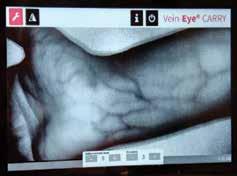
The only portable vein-finding solution that can be carried into and used in virtually all care settings.
The Vein-Eye CARRY effectively illuminates veins in even the most difficult patients – pediatric, elderly, critically ill, and obese – providing quick and easy access to veins in the most challenging situations, and is able to quickly pinpoint leakage of medicine from an IV.
Care delays occur in approximately 25% of all patients, regardless of care setting, due to the inability to establish IV access.

note: The following supply chain leaders were featured in The Journal of Healthcare Contracting ’s Ten People to Watch issue.

these services nationally. We’re also setting up gatekeeping functions to review services contracts through finance and supply chain resources. It’s been highly effective because in a system our size, we weren’t making financial decisions with the aware ness we should have.
What changes brought about by the pandemic are here to stay in the supply chain?
We’ve created two FTEs with the sole function to ensure resiliency and redundancy with supply chain operations. We’ve included ques tions in all of our supplier QBRs that include a second-tier look into their manufacturing processes and geography and labor policies. And we’ve developed a more robust rela tionship with CMOs, national clini cal executives, quality functions and legal teams to better inform pro cess creation related to vaccine and masking requirements.
How do you keep your team motivated despite conflicts and obstacles?
What are the most important attributes of successful supply chain teams today?
First, being able to transform pro cesses and adapt to a rapidly chang ing supply chain ecosystem. Second, having support from system lead ership to create a vision of “system ness.” Finally, developing data systems
that can support (the first two points) at scale.
What project or initiative are you looking forward to working on? Together with the finance depart ment, we’re in the midst of a threeyear purchased services initiative to discover and standardize many of
My team knows that I have an opendoor policy at all times. I have weekly one-on-one meetings with my direc tors and monthly meetings as a group. This allows for any conflicts that arise to be dealt with in an expe dient manner. Nothing is allowed to go unanswered and churn into dis satisfaction. In other words, I know my team’s business well.
We have hired people for whom success is the great motivator. I allow teams to be managed without my interference, and they can trust me to respond to any difficulties and roadblocks they may encounter. This has allowed them to knock their goals out of the park and the entire organization is aware of this success.
The quality that I most find lack ing is the willingness to wade into conflict and resolution. Most lead ers are hesitant, especially in today’s healthcare environment, to stand for, or even entertain, solutions that require bold change.
So often the structure of an organization is the very thing that dictates outcomes, and there is a great reluctance to restructure. “The way we have always done it” is no longer going to be acceptable.
Keeping eyes on the wrong prize. So many leaders tend to speak in platitudes and generalities without focus. An organization’s goals should be able to be articulated in three sen tences, not three words. Everyone in the organization should be able to repeat the three goals easily and without question of interpretation. Mission statements should remain that which was established at the beginning of an entity, not take the place of clear goals.
Having grown a terrific team at CommonSpirit, I aspire to learn about supply chain in healthcare more com pletely. Healthcare lags behind other industries such as manufacturing and retail when it comes to best-in-class supply chain development. Health care leaders are just now starting to
truly value and develop IT and data functions, which is way behind other industries. I’d like to continue to learn and help reshape the industry as befits the people we serve.
By far, the most important trait for me is to hire people with emotional maturity. You can tell a great deal from an interview that veers out
side the technical questions, and I ask people to talk about themselves through their experiences. For the most part, you can teach and pro vide education to develop work skills, but it’s much more difficult to teach people how to get along with each other. We do offer emo tional and professional develop ment counseling, but it’s much bet ter to hire people who bring their maturity – and I don’t mean age –to the job.
Conrad Emmerich, SVP, Supply Chain, Lab, Imaging & Chief Product Officer, Atrium Health
What are the most important attributes of successful supply chain teams today? Collaboration, communication and trust.
ʯ Collaboration: It’s imperative for success that we share a common understanding of the challenges facing supply chain today and
What are the most important traits to look for when hiring a new employee?
tomorrow. This shared under standing means working hard to partner with and align internal customers, as well as vendor partners we work with every day. We must develop solutions together to meet the common goal of improving health.
ʯ Communication: Your team and your leaders need to know where and how your supply chain opera tions are evolving. Strong com munication is required to keep teams informed, motivated and focused. Communicating in a vari ety of ways, formal and informal is essential for success. You are always sending a message, even when you don’t know it.
ʯ Trust: There are few attributes that can damage a team’s ability to win each day more than lack of trust. Highly successful teams push each other to be great and conflicts may arise, but the hard conversations only make the out put better and the team stronger.
What project or initiative are you looking forward to working on?
I’m looking forward to our organi zational ESG work and how sup ply chain can lead. Supply chain can play a significant role in mak ing an organization’s commitment to sustainability real. The World Health Organization (WHO) says climate change is the biggest health threat facing humanity. We, as an entire supply chain community, can drastically change the emis sions output caused by healthcare. In addition, we can impact how our organizations work within the com munities in which we reside though supplier diversity. We are working to bring more local, minority-owned
vendors to our organization for the opportunity to earn business. This brings significant value to the com munities we serve.
What changes brought about by the pandemic are here to stay in the supply chain?
Resiliency isn’t a buzzword. It’s always been in the DNA of robust supply chains throughout industry. However, it’s a requirement now for anyone in this business. The advancement of transparency in the supply chain, and
support. I think we all make each other better people.
How do you generate great ideas in your organization?
By listening. We don’t have the answers in our function, but our frontline teammates who have a different perspective know what’s working and what isn’t working. Lis tening is often overlooked as a busi ness strategy and, in many cases, thoughtful listening holds the keys to success.
the partnerships between providers and manufacturers must continue. The transition to vertically integrated supply chains can only benefit our ability to reduce supply chain disrup tions. Another element here to stay is the redistribution of the globalization of supply chains. Nimble organiza tions will be less reliant on some spe cific regions going forward.
My strong, tight-knit family. I’m so lucky to have their strong
What are the most important traits to look for when hiring a new employee?
After determining if someone has the skills and experience required for a role, I look to see how they will complement the team. How will they make us better? What gap do they fill? How will their style and person ality elevate the team? My goal is to diversify our team, skill sets, mind sets and backgrounds. However, one thing I won’t compromise on is char acter. That’s how you treat people and how you conduct business.
We, as an entire supply chain community, can drastically change the emissions output caused by healthcare. In addition, we can impact how our organizations work within the communities in which we reside though supplier diversity. We are working to bring more local, minorityowned vendors to our organization for the opportunity to earn business. This brings significant value to the communities we serve.
The state-of-the-art facility will offer same-day surgeries in specialized operating rooms.
By Pete MercerAs healthcare costs continue to rise throughout the country, consumers and patients are looking for lower cost op tions without sacrificing the quality of care that they need. Ambulatory surgery centers provide that exact type of care experience that so many people in this country are looking for, providing an alternative care route that is financially feasible and efficient.
Intermountain Healthcare recently opened a state-of-the-art ambula tory surgery center at St. George Regional Hospital in St. George, Utah. Intermountain Surgery Center –St. George will offer same-day urol ogy and orthopedic surgeries in four specialized operating rooms, and most patients will be able to recover at home shortly after surgery.
Dr. Jordan Ash, anesthesiolo gist and medical director for Inter mountain Surgery Center, said in a media release, “I’m excited to work in a facility that will be stream lined with the latest technology and designed for specific surgeries. This will also help lower the cost for some of our most common orthopedic surgeries.”
“The high cost of healthcare is daunting for many members of our community,” said Katie Allsop, the administrator of the Ambu latory Services Center at Inter mountain St. George Regional Hospital. “The Intermountain Sur gery Center St. George provides a cost-effective surgical outpatient service. Patients know the cost of their surgery up front, which will not change even though there are variabilities like surgery times, sup plies used and recovery.”
This facility, like many ambula tory sites throughout the country, is designed to provide outpatient care that includes various ortho pedic surgeries, neurological sur geries, urological procedures and gynecological surgeries.
Part of the value that ambulatory sites provide both patients and providers is an increased sense of efficiency, with out the care processes suffering. Inter mountain Surgery Center is equipped with the latest technology to improve patient care and staff workflow.
Allsop said, “The surgery center improves efficiencies for Intermoun tain by moving appropriate healthy patients to the ASC where they can receive their surgeries and be dis charged home without being delayed due to the unpredictability of the hospital OR. Additionally, it frees up operating room time in the hospital
for patients who require a higher level of care due to health issues and more complex surgeries.”
By adding this ambulatory site, St. George Regional Hospital is able to provide an experience that is not interrupted by emergent add-ons for the providers. “They are partnered with ASC caregivers who know them and are able to anticipate their needs, facilitating great time management during surgery and rapid turn-over between cases,” Allsop said. “It benefits patients by providing lower costs, shorter waiting times, lower risk of infection and expert, compas sionate care from nursing caregivers trained especially for the fast-paced ASC environment.”
Intermountain is adding ambu latory sites across their system. Simi lar facilities have been developed or are under development in Murray, Logan, Park City, Provo, Saratoga Springs and Ogden, and several more are planned.
“Patients know the cost of their surgery up front, which will not change even though there are variabilities like surgery times, supplies used and recovery.”

As patient volumes return to prepandemic levels, nurse turnover has doubled and half report feelings of burnout, according to a new report from Vizient, Inc. and Vaya Workforce. In addition, research ers found that while contract labor utilization continues to surge, the amount of time nurses are able to spend with patients dropped earlier this year to its lowest level since before the pandemic.
Many hospitals and health sys tems continue to rely on contract labor to fill vacancies. According to Vaya Workforce, a leader in contract labor staffing, approximately 28,000 travel nurse jobs are currently open compared to 8,700 openings on aver age in 2019. Vaya’s data is representa tive of close to 80% of the total mar ket. Vaya also forecasts demand for travel nurses to remain at least 20% above pre-pandemic levels through out 2023. These predictions are based on historical travel demand, economic variables, acute care hospital census,
Delivering cytokines in immu notherapy can signal an immune response that kills off cancer cells, but resulting inflammation also can create an environment that encour ages cells to mutate and tumors to grow. Gathering detailed informa tion on how cytokines function within specific types of cancer can help navigate the complex pathways tumors use to evade treatment and make strategies like immunotherapy more successful.
The NIH funding supports the next step in a decades-long research program at the Lerner Research Institute conducting groundbreak ing research on cytokines, immune response and inflammation.
Employment data spanning April 2019-June 2022 from the Vizient Operational Data Base (ODB), which contains data from 650 healthcare facilities representing over 164,000 nurses show a 20% increase in nurse overtime hours. The ODB also shows overtime doubling during that same period from approximately 4% to 8% for licensed nursing staff. Taken together with a 2022 benchmark from Safe and Reliable Healthcare of more than 26,000 nurses finding 50% have feelings of burnout, the report serves as a wakeup call for healthcare leaders.
nursing core vacancies and other pub lic and private data sets.
Cleveland Clinic receives $12M NIH grant for cancer treatment research
Cleveland Clinic’s Lerner Research Institute was awarded a five-year $12 million grant by the National Cancer Institute, part of the National Insti tutes of Health, to define how cyto kines – proteins produced during immune response – regulate inflam mation and interact with cells and molecules surrounding tumors.
University of Utah Health has launched a new initiative that seeks to better integrate digital health applications into daily medical care including prevention, diagnosis, and treatment of cancer, heart disease, and other life-threatening conditions.
The Digital Health Initiative (DHI) aims to develop, evalu ate, and distribute tools designed to improve mental health, home monitoring, self-care, and patientcentered clinical decision support. The goal is to create health apps that are more scientifically based and reliable than those that are currently available. DHI is sup ported by a substantial grant from the Office of Senior Vice Presi dent for Health Sciences at U of U Health.
- 19.5” Diameter x 29.5” Deep Chamber Size
- Wheel mounted design to facilitate installation
- All of the features and capability of a large capacity autoclave, at a fraction of the size and cost

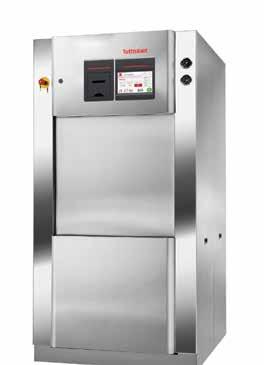

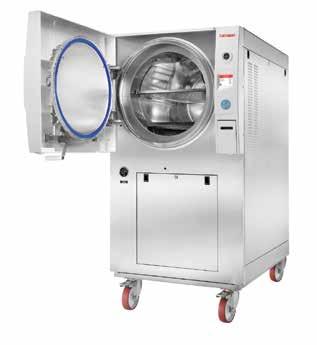
- Non-Proprietary readily available components
- 20”W x 20”H x 38”D Chamber Size
- Space saving, fully automatic vertical sliding door
- Flexible installation options
- Non-Proprietary readily available components
- Double-layered tempered glass door for visual monitoring
- Spray Arm for continuous washing validation
- Instruments are completely dried
- Multi color chamber LED light (White, Green, Red) operates during loading, unloading and running the program


COVID, inflation and staffing shortages were just a few of the stories that made headlines in healthcare this year.
We’re almost three years removed from the massive shutdowns and disruptions caused by the COVID-19 pan demic. In a lot of ways, those first few months of 2020 have shaped the way we have looked at 2021 and 2022.
For businesses and industries, 2021 was a year of recovery and rebuilding. A vaccine was introduced to the general public in early 2021, which gave us an edge against the pandemic while dividing the country over the effi cacy and safety of the vaccine. Mandates for the vaccine created further division, while variants popped up that challenged the vaccine’s effectiveness.
2022 has been a year of reconnection for people and businesses across the world. Travel has largely resumed with very few, if any, travel mandates in place throughout the world. Many of the surviving businesses have rebuilt and functionally grown in the last year, as in-person meetings and networking events have resumed operations. While vac cinations and natural immunity has rendered COVID-19 less deadly, it hasn’t entirely eradicated the virus.
There have been plenty of challenges this year as well. Disruptions are still clogging up the supply chain, straining an already incredibly fragile system. Core infla tion rates hit 8.2% for the United States this year, the highest in 40 years. Healthcare is constantly challenged by staffing shortages, burnout, supply chain disruptions, and inflation. Making things more complicated for the entire world, Russia invaded Ukraine in February of this year, putting a strain on political relations and forcing busi nesses with operations in Russia to make some difficult decisions regarding those relationships and facilities.
In September, the FDA authorized omicron booster vaccines for Moderna and Pfizer for a single booster dose. This was the beginning of a national rollout of omicronupdated COVID-19 vaccines. Both vaccines were more effective against omicron strains, and Pfizer’s was even authorized for people as young as 12 years old.
To fully understand the scope of the challenges and successes of 2022, let’s take a look at some of the biggest events throughout the year.
For the entirety of 2022, omicron was the dominant strain of COVID-19. After reaching the United States in December 2021, omicron strains have peaked and troughed throughout the year, generating mostly milder
symptoms compared to the previous variants. Based on weekly COVID reports by Mark Van Sumeren, omicron cases began to recede in February, before two sister vari ants, BA.4 and BA.5, emerged in April. BA.5 is still the dominant strain of omicron.
In September, the FDA authorized omicron booster vaccines for Moderna and Pfizer for a single booster dose. This was the beginning of a national rollout of omicron-updated COVID-19 vaccines. Both vaccines were more effective against omicron strains, and Pfizer’s was even authorized for people as young as 12 years old. FDA Commissioner Robert Califf, MD, said in a state ment, “As we head into fall and begin to spend more time indoors, we strongly encourage anyone who is eli gible to consider receiving a booster dose with a bivalent COVID-19 vaccine to provide better protection against currently circulating variants.”
In June, Vizient released its annual Impact of Change® Forecast from its subsidiary Sg2, projecting hospital resources will experience even greater strain due to a rise in patient acuity over the next decade that will outpace inpatient volume and impact patient length of stay. Fueled in part by COVID and its lingering effects, health care organizations can potentially expect increased number of patients with more complex condi tions creating capacity constraints that may require new strategies for patient care delivery. The forecast predicts that adult inpatient volumes will recover from pre-pan demic numbers, but only having gradual growth by 2% over the next decade.
Most recently, experts are concerned that a swarm of COVID-19 variants could push a winter surge this year that is continuing to mutate against immu nity. Additionally, as the flu season continues to esca late, hospitals are preparing for what could be a very difficult season. In an NBC News report, Dr. Carlos Del Rio, an executive associate dean at the Emory Uni versity School of Medicine and Grady Health System in Atlanta, said, “If you go around the nation and ask hospitals how busy they are, every single one of them will tell you: They’re busy.”
In the same report, Matthew Binnicker, director of clinical virology at the Mayo Clini said, “We’ll see an increase in COVID cases – probably not to the extent that we saw in the winter of 2020 and winter of 2021 –but we will see a rise. Most of those will be infections that lead to mild to moderate illness.”






Inflation is the highest it’s been in 40 years. In April, Dukal examined the inflation pressures on the healthcare supply chain. The report found that there were three key reasons for the current inflation hike:
ʯ Lockdowns and labor shortages. After businesses and cities shut down across the world at the beginning of the pandemic, it’s been a long road to recovery for many organizations. Lockdowns and surges persisted, leaving many manufacturers to scramble to maintain consistent product levels.
ʯ Global logistical backlogs. Last year, we saw a record number of container ships that were waiting to dock in ports on the Pacific and Atlantic coasts. The report said, “With unprecedented ocean volumes from Asia and domestic land transportation stretched thin, back logs drove many supply chains to a halt.”
ʯ Raw material and product shortages. Across the world, there has been a shortage of raw materials, leading to a shortage of finished goods.
The rise in inflation has created many challenges for healthcare, not least of which involves the purchase of supplies and medical equipment. As the largest equip ment-focused national medical distributor in the U.S., CME is seeing annual price increases that are four or five times higher than usual. Cindy Juhas, chief strategy offi cer of CME told FOX Business in May, “The manufacturer for one of CME’s most popular wheelchairs added a 20% surcharge to cover the cost of raw materials and freight for the product in the last four months.”
The FOX Business report also found that crutches went up 20%, and exam tables, up 20-30%, were back logged four to five months. Juhas projected that the increase in costs and shortage of supplies will last the year and push into 2023.
Early 2022 saw a massive socio-political upheaval in the Russian invasion of Ukraine, a staggering move that sent ripples across the world in various mediums. Most notably, this invasion spurred many organizations with operations in Russia to reconsider those business relationships altogether. Organizations like Owens & Minor and S2S Global, a Premier subsidiary, donated essential medical supplies
to the people in Ukraine. HIDA issued a press release in late April acknowledging that members of HIDA had contributed over $15.75 million in and cash and in-kind donations to humanitarian efforts in Ukraine.
Matthew J. Rowan, HIDA President and CEO, said, “We are proud that our industry can partner with humani tarian relief organizations to deliver critical medical sup plies to the Ukranian people.”
Cindy Juhas, chief strategy officer of CME told FOX Business that the “war on Ukraine is only exacerbating those supply chain issues –which persisted over the past two years – because Russia is a major producer of nickel, chrome, and steel.”
In July, Banner Health announced that emergency trauma physicians were delivering live virtual training ses sions on trauma for medical professionals and healthcare workers on the frontlines of the conflict. The sessions included training on basic trauma care, as well as scenar ios involving crush injuries, blast wounds, burn treatment, and mental health trauma. Each session took place in the Simulation Emergency Trauma Center, using mannequins with realistic wounds to teach how to clinically assess and treat these patients.
The ramifications of the Russian-Ukranian conflict also extend to the healthcare supply chain, causing dis ruptions for equipment like canes, crutches, exam tables, and wheelchairs. Cindy Juhas, chief strategy officer of CME told FOX Business that the “war on Ukraine is only exacerbating those supply chain issues – which persisted over the past two years – because Russia is a major pro ducer of nickel, chrome, and steel.”
Starting in March, Supply Chain Dive tracked the shift to 24/7 supply chain operations for public and private sectors across
You may not know Baxter as well as you know Welch Allyn, but that’s about to change. A strong legacy of healthcare progress meets a future of new possibilities that will help your team make the days and lives of clinicians easier.


To see how we’re transforming care visit www.baxter.com/meet-acute-care
Baxter and Welch Allyn are trademarks of Baxter International Inc. ALL RIGHTS RESERVED. APR425001 Rev 1 08-NOV-2022 ENG-US
the country. Ports across the country were attempting to engage with dozens of stakeholders to try to improve the operations, resulting in regulatory tweaks and a series of commitments from the private sector. In October of 2021, President Joe Biden announced the Port of Los Angeles’ goal to move to 24/7 operations, saying “A 24/7 system is what most of the leading countries in the world are already operating on. Except us, until now.”
In April, White House officials said that even though COVID-19 exacerbated issues with the sup ply chain, the issues were not created by the pandemic. The New York Times reported that economists analyzed supply chain disruptions as part of the Economic Report of the President. The report says, “Because of outsourcing, offshoring and insufficient investment in resilience, many supply chains have become com plex and fragile. This evolution has also been driven by shortsighted assumptions about cost reduction that have ignored important costs that are hard to turn into financial measures, or that spilled over to affect others.”

In 2021, we witnessed a unique phenomenon in the work place known as “The Great Resignation,” as hordes of employees resigned from companies for a litany of rea sons. This was not an industry-specific occurrence, but it swept across healthcare as staff experienced heightened anxiety and burnout from the pandemic.
In one example, healthcare laboratory industry offi cials said their sector was hit especially hard. Tara Luel len, VP of Laboratory Director Services at Lighthouse Lab Services told Dark Daily, “The lab industry has been hurt at the greatest extreme from this Great Resignation just in terms of the dire need for lab roles and the small pool of correctly qualified individuals in many instances.” Because it’s a highly specialized industry, it’s creating more challenges for healthcare labs as fewer new lab techs and pathologists are entering the field while many of the cur rent crop of lab professionals are leaving.
The Great Resignation also affected nurses, physi cians, and long-term care staff. In May, a diverse group of frontline nurses, nursing leaders, patient safety represen tatives, CEOs, CFOs, and HR professionals launched the Nurse Staffing Think Tank. This group meets to tackle a wide range of issues related to the nurse staffing crisis, like the impact of COVID-19 on nursing and the importance of trust and transparency in a healthy work environment.
In September’s issue of Repertoire, Dr. Robert Pearl examined the root causes of burnout, which physicians are being affected the worst, and what can be done to fix it. According to a Medscape survey of 13,000 doctors, the nation’s most burned out physicians are in emergency medicine and critical care, experiencing “long-term, unre solvable job-related stress that leads to exhaustion, cyni cism, and feelings of detachment.” These types of psy chological issues are predictable outcomes for physicians who have been fighting a continuous and stressful battle against COVID-19.
The road ahead is, for lack of a better word, uncertain. Supply chain disruptions are likely not going away any time soon. COVID, while not as much of a threat as it was this time last year, is still putting people in the hospi tal. We are still in an active pandemic scenario.
There’s no way to know what 2023 will hold. There will be new challenges, yes. But there will also be new breakthroughs for healthcare organizations. New ways to succeed in this industry. New ways to tell the story of healthcare.
If there’s anything to derive from the last year –or even the last three years – it’s that we can rebound, recover and reconnect with each other, even in the most difficult of circumstances. That even in the darkness, the dawn is still coming.



DETECTO’s brand new, innovative and highly customizable MobileCare medical carts offer the most advanced security level features in the medical carts market with nearly unlimited configuration and color possibilities available.
There are three lock types to choose from:
ʯ Electronic Lock – RFID with three different frequencies available and full-color touchscreen pin code ʯ Quick Release ʯ Keyed Lock
Windows software is included for one centralized point for all employee cart access and security settings, including Wi-Fi or Blue tooth for instant updates. The pro prietary onboard and PC software has been developed by DETECTO.
The innovative quick release unlocking can save lives when a patient codes, and the breakaway plastic tags and red/green flag can be reset easily by biomed technicians.
MobileCare carts offer robust cart customization. They come with the
choice of three unlocking meth ods: one lock and individual drawer sensors, individual drawer locks and individual drawer sensors, or sim ply one lock. Detailed employee audit tracking mitigates narcotics theft and user setup can be done at the cart or within the included Windows software.
Up to 5,000 users are available per cart, and dual authentication is available by RFID and pin code touchscreen entry. The PC software can update individual users, carts, locations/buildings and departments, and hold up to 50,000 records. It can print, download and export detail his tory reports, and history tracking is available to check accountability of individual drawer inventory.
The full-color touchscreen LCD features graphical menus for intui tive prompts and easy usability, and multiple alarms are featured on the
electronic carts, through both audible and e-mail/text notifications.
Ten standard colors come with unlimited Pantone and RAL color options. The ABS thermoplastic countertop with molded edges is one continuous piece for optimal hygienic cleanup. Handrails can be specified on all three sides with two, one or no handrails. Spacious soft-close draw ers glide shut for more convenience and two self-closing side extension trays are included standard for addi tional counter space.
MobileCare carts are manufac tured from an aluminum cart body and have high-impact plastic bumpers and an ABS countertop. The five-inch, 13-centimeter diameter wheel casters feature anti-static, total lock and bead chain for static dissipation that pro vide easy mobility for smooth trans port and nimble maneuvering.
The carts come standard with full wrap around, high-impact bumper trim, extending beyond the handrails for complete protection. Versatile corner extrusion mounting provides easy optional accessory attachment and customized locations.
A full range of accessories are available, including IV poles, sharps container holders, defibrillator shelves, cardiac boards, oxygen tank holders, 12-bin organizers, catheter holders, waste bins and more. The carts are made in the U.S. with Amer ican and foreign components and are TAA compliant.




A new nonprofit healthcare supply chain association aims to champion standards and best practices.
From Jesse Schafer’s vantage point as a senior manager of business continuity at the Mayo Clinic, supply chain resiliency is keenly needed in healthcare. “It’s a complex issue too difficult to solve individually,” he said. “There are cultural, operational, and economic barriers.”

When asked what’s missing in the supply chain regarding resiliency and transparency, Schafer said standards, incentives, and culture.
1. “There are too many solutions in the market. As such, trading partners cannot scale nor sustain the approach.”
2. “Historically, price drives pur chasing decisions. In a post pandemic world, providers are more often seeking to evalu ate supplier resiliency as a key factor in sourcing decisions.”
3. “There is a lack of trust when sharing resiliency data between trading partners, and a corresponding lack of clarity in how the data will be used.”
To help break down those gaps, a group of healthcare supply chain pro vider and supplier stakeholders recently formed the Healthcare Industry Resil ience Collaborative (HIRC), a nonprofit healthcare supply chain association that champions standards and best practices in supply chain resiliency.
The vision of HIRC is to cre ate a more transparent and resilient supply chain through collaboration between providers, suppliers, and industry partners, said Schafer, exec utive director for HIRC. “We work as a community to develop and align to sensible standards and a one-tomany approach.”
Members convene in a variety of monthly engagements, including: member calls to share best practices, key initiatives to develop industry solutions, best practice groups to share lessons learned, and online forums to enrich the community know-how. Monthly market watch articles and collaborative research are additional resources provided. “Membership provides access to a community of thought leaders focused on clear goals and deliver ables in resiliency,” Schafer said.
Resiliency is a common challenge across healthcare stakeholders, Scha fer said. “It’s present at all stages of
the supply life cycle. As such, the inter face between providers and suppliers is critical to tackling opportunities and barriers. When problems and solu tions are addressed collaboratively, the resulting solutions are far more effec tive. To solve for resiliency, it must be addressed as a common goal.”
HIRC’s focus areas include stan dardizing resiliency key performance indicators; creating a framework to measure attributes through scorecard ing; and increasing supply chain vis ibility for greater continuity of critical supplies. The organization also focuses on risk assessment and increased trans parency through data sharing.
“Each standard offers a one-tomany approach that’s easy for trading
partners to engage and enables discus sions to progress to greater insights and actionability,” said Schafer. “Addi tional focus areas include resiliency KPI and resiliency technology.”
In 2023, key initiatives may include: ʯ Supplier resiliency certification an evidenced-based certifica tion that demonstrates supplier business continuity management proficiency
ʯ Resiliency database – an AI and community curated platform to track critical healthcare items, supply disruptions, and suitable alternative products
ʯ Supply disruption market watch an AI and community curated platform to identify the most relevant and actionable supply dis ruption intel across the industry.
Better outcomes for all Tom Harvieux, chief supply chain officer at BJC HealthCare, and board member and chair-elect of HIRC, said healthcare supply chains have historically been built around low cost, which proved to be a significant weakness during the recent pandemic and subsequent global supply chain shortages. “Improving resiliency and end to end visibility is critical to not letting the past repeat itself,” he said.
Resiliency in healthcare is about delivering the right products and ser vices at the right time and place, as well as delivering better outcomes for patients, said Joe Robinson, vice president, enterprise risk & continu ity at Medtronic, and board mem ber of HIRC. Since the COVID era began, supply chains around the world have experienced a wide variety of challenges, shocks, and disruptions. “Now, more than ever, we need a community partnership focused on reducing these impacts to
Tom Harvieux, chief supply chain officer at BJC HealthCare, provided several key components of HIRC’s mission: ʯ
HIRCs only motive is to improve healthcare resiliency. Having the inter ests of all stakeholders at its core is a tenant that sets the stage for real dialog and collaboration. ʯ
Suppliers, providers, GPOs, academics, and industry experts all have an equal seat at the HIRC table. All that is required is support of working together to improve healthcare resiliency. ʯ
Industry-wide change must be done at scale. This mandates that stan dards, formats, and guidance must be done in common manner. HIRC is about developing solutions that meet provider and suppliers needs while preventing development of hundreds of unique efforts. ʯ
HIRC supports commercial entities efforts to offer industry solutions and technology. HIRC seeks to drive standards that can be deployed in unlimited ways.
the medical supply chain,” Robinson said. “Medical providers and suppli ers must work together to improve patient outcomes and drive improve ments within the supply chain. That is exactly what HIRC is doing.”
HIRC was formed by Mayo Clinic and Spectrum Health before the COVID pandemic but gained broad industry support coming out of the challenges of the past three years. Jim Francis, chief supply chain officer at Mayo Clinic, helped drive the launch of HIRC. “Mayo Clinic Supply Chain Management Division is pleased to support the efforts of HIRC and looks forward to partici pating in its mission of increasing the resiliency of the supply chain,” Francis said.
Lessons learned through the pandemic and on-going supply dis ruptions present the most opportune time to address transformational needs of the supply chain, he said. “This industry collaborative pres ents the best opportunity to address needed changes as an industry rather than on an individual provider and/or industry partner basis,” Francis said.
“HIRC is uniquely positioned to create a common place for suppliers, providers, GPOs, industry forums, and academics to work in transparent and open dialog,” Harvieux said. “This is how we collectively will change and improve healthcare resiliency.”
Robinson said HIRC is a true collaborative partnership that aligns suppliers and providers with the com mon goal of improving patient out comes. “We focus on standardizing our approach to resilience, creating consis tent and repeatable resilience expecta tions between suppliers and providers,” he said. “Our members create scale for the healthcare community and this scale leads to a future of more consistent supply expectations, once again lead ing to better outcomes for patients.”
Harvieux said you can expect to see HIRC continue to grow mem bership and to continue to develop well thought out, cross industry standards that are widely adopted as a common framework for resiliency discussions and formal improve ment work between trading partners. “While lots has been done, HIRC is really starting to hit its stride!”
Ann & Robert H Lurie Children’s Hospital of Chicago
AdventHealth
Adventist Health
Allina Health Aspirus, Inc Banner Health BayCare BJC HealthCare
Brattleboro Memorial Hospital CentraCare Centura Health
Children’s Hospital of Philadelphia City of Hope Cleveland Clinic CommonSpirit Health Dartmouth-Hitchcock
ECU Health Encompass Health Henry Ford Health HonorHealth Inova Health System Intermountain Healthcare Kaiser Permanente Legacy Health LifeBridge Health Loma Linda University Health Mass General Brigham
Ascent Brands ASP Global Baxter Healthcare BD
Cardinal Health Cook Medical DeRoyal Direct Supply Innovative Health J&J
Association for Health Care Resource & Materials Management (AHRMM)
Capstone Health Alliance Gartner
Global Healthcare Exchange (GHX) Health Industry Distributors Association (HIDA) Peer Supply
Mayo Clinic MD Anderson Cancer Center
Methodist Health System - Dallas MultiCare Health System
MetroHealth
Munson Healthcare Northwestern Medicine Ochsner Health
OhioHealth Ohio State University Wexner Rush University Medical Center RWJBarnabas Health St. Luke’s Health System
Spectrum Health Stanford Health Care Trinity Health UC Health System University Hospitals University of Miami Health University of Michigan Health UVM Health Network
Vermont Psychiatric Care Hospital Vanderbilt Health Vidant Health WellSpan Health Wellstar Health System Westchester Medical Center Health Network
J2 Medical Supply Medline Medtronic Philips North America Rhino Medical Supply Sandoz S2S Global Stryker Sysmex W.L. Gore
Premier, Inc.
Strategic Marketplace Initiative (SMI) Supply Risk Solutions (SRS)
University of Arkansas - Sam Walton College of Business Us Pharmacopeia (USP) Walton College of Business Vizient, Inc

Supplier diversity is a strategic commitment to provide equitable access to purchasing and contracting opportunities for diverse businesses. Some of HIDA’s member companies have had supplier diversity programs for 30 years or more. The conversation on supplier diversity is being driven by our customers, especially healthcare providers serv ing historically underrepresented communities. These healthcare entities are becoming more intentional about purchasing healthcare products from diverse suppliers.
By Stephanie Reed, Director of Education, HIDASupplier diversity is an important goal for many reasons. It promotes innovation, identifies new sources of talent and rewards experience. It encourages competition, which improves product quality and drives down costs. Supplier diversity builds wealth and cre ates health equity in the communities we serve. Consider this: Healthcare is 18% of the GDP of the United States. That’s over $4 trillion. But the total diversity spend in healthcare is estimated at $6 billion. That’s just 0.15% of that total. A strong supplier diversity program allows healthcare systems to promote wealth in the communities they serve, which ultimately supports improves health equity.
Supplier diversity builds wealth and creates health equity in the communities we serve. Consider this: Healthcare is 18% of the GDP of the United States. That’s over $4 trillion.
HIDA is working to promote supplier diversity. In September, we convened our firstever Supplier Diversity Summit as part of the fall Streamlining Healthcare Expo & Busi ness Exchange. This summit was inspired by HIDA’s commitment to diversity and inclu sion. The overflow crowd heard from panelists
who urged an intentional approach to sourc ing from diverse suppliers.
Distributors have a role to play in supplier diver sity, by helping providers meet their goals. Dis tributors can create their own supplier diversity programs and assist providers in identifying qualified and certified diverse suppliers. “The key to a strong supplier diversity program is having buy-in from your organization’s C-suite and leadership ranks,” said Bill Moir, Senior Vice President for Supply Chain Management at Henry Ford Health in Detroit, Michigan. “Once this becomes an organizational prior ity then having dedicated resources to lead the program and developing a strategy to identify, engage, and award to diverse suppliers are key next steps in your supplier diversity journey.” ʯ Network. Network. Network. Distributors should partner with a minority company to assist in the creation of a first-class program. ʯ Don’t Wait To Be Asked. Be proactive by presenting diverse suppliers to your provider customers. Provide a list of MBEs and the products that they distribute. ʯ
Ask The Right Questions. Be Inquisitive. Ask providers questions to gauge their supplier diversity needs. Does the provider have Supplier Diversity goals and initiatives? What is the dollar goal of the provider? Where is the desired need for spend – on services, products, etc.?
Becerra) struck down the requirement for zero-co-pay coverage for certain preventive health recommendations issued by the U.S. Preventive Ser vices Task Force. The reason? The USPSTF members are not properly appointed under the U.S. Consti tution’s Appointments Clause, the judge ruled.
He also ruled that insurers were not obliged to provide zero-co-pay coverage for pre-exposure prophy laxis (PrEP) for HIV prevention, on the grounds that the provision vio lates the rights of employers under the Religious Freedom Restoration Act. (A ruling regarding zero-co-pay contraceptive coverage was yet to be made at press time.)

The decision – which was under appeal – left untouched the provision of zero-co-pay preventive services recommended by the Advisory Com mittee on Immunization Practices (ACIP), as well as two sets of guide lines from the Health Resources and Services Administration (HRSA): Women’s Preventive Services Guide lines and the Bright Futures program for newborns through adolescents up to age 21.
Healthcare providers reacted harshly to a U.S. District Court judge’s deci sion in September that shakes the foundation of one of the most popular aspects of the Affordable Care Act (aka Obamacare), that is, the responsibility of non-grandfathered group or individual market health plans to make available about a hundred preventive services to members with zero co-pay.
“If today’s ruling stands, it will jeopardize health outcomes by creating financial barriers to screenings, coun seling and preventive medications that improve our patients’ health,” tweeted Sterling Ransone Jr., MD, FAAFP, then-president of the American Academy of Family Physicians.
Among the zero-co-pay services threatened are blood pressure screen ings, cancer screening, cholesterol
screening, screening for sexually trans mitted infections and fall-prevention exercise interventions for some adults over 65. They are among the so-called “essential health benefits” associ ated with plans available through the Health Insurance Marketplace.
Issued by U.S. District Judge Reed O’Connor in Texas on Sept. 7, the decision in Braidwood Man agement v. Becerra (formerly Kelley v.
The decision came just nine months after the Assistant Secretary for Planning and Evaluation (ASPE) – the principal advisor to the Sec retary of the U.S. Department of Health and Human Services – issued a report making the case for essen tial health benefits. In January 2022, ASPE reported findings from its research, including: ʯ
More than 150 million people – including 58 million women and 37 million children –can receive preventive services without cost-sharing under the Affordable Care Act, along with approximately 20 million Medicaid
adult expansion enrollees and 61 million Medicare beneficiaries that can benefit from the ACA’s preventive services provisions.
ʯ Evidence from studies examining the impact of the ACA indicate increased colon cancer screening, vaccinations, use of contraception, and chronic disease screening.
ʯ Expanded access to recom mended preventive services resulted from increases in the number of people covered through private health insurance and Medicaid expansion under the ACA.
Insurers themselves were quiet about the District Court ruling. A spokes person for AHIP – a national asso ciation of health plans – declined to comment to Repertoire on the Braid wood decision except to say that “AHIP has an extensive track record of support for the existing protec tions for preventive care.”
Meanwhile, a spokesperson for the Purchaser Business Group on Health said that “most large employ ers take advantage of the first-dol lar coverage to promote health and well-being, retain employees, to promote equity and for longterm cost savings. This rule will not change things for our members, who are among the largest employers in the country.”
In a commentary published by the Commonwealth Fund , Timothy Jost, emeritus professor, Washing ton and Lee University School of Law, wrote that it is unlikely insur ers or group health plans will drop coverage without cost sharing in 2023. “If a nationwide injunction is entered, however, it may well lead to various insurers and health plans offering different cost-sharing levels
for services, which could make comparing plans more difficult,” he wrote. “It also might make it easier for insurers to try to avoid covering people with health needs by cover ing or avoiding coverage for partic ular services. This would undermine another key goal of the ACA – mak ing sure people are covered regard less of preexisting conditions.”
In contrast to the payer communi ty’s muted reaction to the ruling, the medical community was outspoken in its dissent. Six weeks before the decision became public, 61 medi cal organizations sounded the alarm, including the American Medical Asso ciation, American Academy of Fam ily Physicians, American Academy of
Pediatrics, American Association of Public Health Physicians, American College of Cardiology, American Col lege of Gastroenterology, American College of Physicians and the Ameri can College of Radiology.
“We are extremely concerned that [the] case ... could significantly jeopardize the coverage of preven tive health care services for millions of Americans with private health insurance and reverse positive trends in patient health achieved by the early detection and treatment of dis eases and other medical conditions,” they wrote.
A spokesperson for the Ameri can College of Obstetricians and Gynecologists told Repertoire that they are “watching what happens with other covered services.”
The Sept. 7 District Court decision in Braidwood Management v. Becerra left some zero-co-pay preventive services intact, but others not. Untouched are preventive services based on two programs of the Health Resources and Services Administration (HRSA): Women’s Preven tive Services Guidelines, and Bright Futures (for newborns and adoles cents up to age 21).
In addition, immunizations recommended by the Advisory Commit tee on Immunization Practices (ACIP) of the Centers for Disease Control and Prevention must continue to be provided with no cost-sharing.
However, the ruling relieves payers from making available “A” and “B” recommendations of the U.S. Preventive Services Task Force (USPSTF) with zero co-pay. These include colorectal cancer screening; falls-prevention pro grams for elderly; screening for Hepatitis B and C viruses as well as HIV; and screening for hypertension, lung cancer and intimate partner violence.
For more information: ʯ ACIP recommendations can be found at www.cdc.gov/vaccines/hcp/acip-recs/index.html. ʯ Women’s Preventive Services Guidelines of HRSA can be found at www.hrsa.gov/womens-guidelines. ʯ Bright Futures guidelines are at mchb.hrsa.gov/programs-impact/bright-futures. ʯ “A” and “B” recommendations of USPSTF can be found at www.uspreventiveservicestaskforce.org/uspstf/ recommendation-topics/uspstf-a-and-b-recommendations.
The last two years have seen COVID-19 variants emerge one at a time across the world, but a multitude of viruses and a new “evolutionary phase” are making health experts nervous, according to The Washington Post

There are currently multiple versions of the omicron variant, and each new subvariant seems to be stronger against immune defenses than the last. Each new strain of omicron has posed a similar threat, and it’s almost too much for experts to keep up with.
The report says that the “pace of evolution is so fast that many scientists depend on Twitter to keep up. A month ago, scientists were worried about BA.2.75,
a variant that took off in South Asia and spawned a cloud of other concerning sublineages. In the United States, BA.4.6 and BF.7 have been slowly picking up steam. A few weeks ago, BQ.1.1 started to steal the spotlight – and still looks like a contender to take over this fall in Europe and North America. A lineage called XBB looms on the sidelines, and threatens to scramble the forecast.”
While it’s easy to get lost in the fray of each new strain, many experts say that focusing on any one possible variant is missing the bigger picture: each new mutation is affecting the receptor binding domain, where virusblocking antibodies dock, giving it an edge against an immunity defense, the report said.
This fall, Walgreens launched the 2022-2023 Walgreens Flu Index to help communities track flu activity in their area and serve as an important reminder to get protected with an annual flu shot. Returning for its ninth season, the Walgreens Flu Index shows that to date, overall flu activity is more than 10 times higher nationwide when compared to the 2021-2022 flu season and has more than doubled over the past two weeks.
“As we head into the fall and winter seasons, our data show significantly higher flu activity early this year when com pared to other flu seasons and it’s increasing across the United States, especially in southern cities,” said Anita Patel, PharmD, vice president, pharmacy services development, Walgreens. “As we return to pre-pandemic activities and spend more time indoors without a mask or social distancing, we are more vulnerable to respiratory infections. To help reduce the spread of respiratory illnesses this season, the best thing you can do is schedule your annual flu shot and updated COVID-19 booster at Walgreens in one convenient stop.”
A national survey showed many are either unsure or do not plan to get vaccinated against flu during this flu season. With rising rates of flu, COVID-19 older and new variants in circulation and other respiratory illnesses, hospitalizations are expected to rise and could result in a strain on the healthcare system. To prevent flu and its potentially serious complications, the CDC recommends everyone 6 months and older should get a flu vaccine by the end of October and before flu begins spreading dur ing the holidays. If individuals are unable to get vacci nated until later, the CDC recommends still getting the flu shot because flu activity most commonly peaks in Feb ruary and can continue through May. It takes about two weeks after the vaccine for antibodies to develop in the body and provide protection against the flu.
The CDC cleared a third vaccine-maker’s COVID-19 booster for authorization in the U.S. on Oct. 19 following the FDA’s vote. Novavax’s monovalent booster is autho rized for adults 18 and older, and the CDC said the deci sion offers another option for those who have completed the primary vaccination series but have not received a booster shot. It also could interest those who are wary of mRNA-based vaccines, like Pfizer’s and Moderna’s shots, CDC Director Rochelle Walensky, MD, said in a state ment. According to the CDC COVID-19 tracker, 68.1% of the nation’s population has completed a primary series and 49% has gotten a booster shot.
Why rural hospitals are facing unprecedented financial pressures and workforce shortages.

To understand just how different a rural hospital is from a metropolitan one, Larry Bedell said to picture a Friday night high school football game. Traditionally, mixed in with the crowd of spectators would be not just the nurses, techni cians, front office staff and doctors of the local hospital, but the hospital executives as well. Patients and providers know each other on a first name basis. “It’s not just a job,” said Bedell, executive director for the National Rural Health Associa tion (NRHA) Services Corporation.
Indeed, the stakes are personal for rural hospital leaders. And the margin for error is smaller. Because rural hospital margins are so tight financially, a bad decision could cost the community their facility. “And there’s not another facility on the next block, like in a metro area,” Bedell said. “I live in Kansas City, a midmarket town. I live within 10 miles of probably 25 hospitals. In a rural com munity, there’s usually not another hospital for over 30 miles. There’s not someplace else for those people to get care if anything happens to that facil ity. That’s quite a bit of stress if you care about that community.”
Judging by recent headlines, rural hospital leaders are facing an incred ible amount of stress in today’s marketplace. The American Hos pital Association released a report this year highlighting the variety of causes that resulted in 136 rural hos pital closures from 2010 to 2021, and a record 19 closures in 2020 alone. These include many longstanding pressures, such as low reimburse ment, staffing shortages, low patient volume and regulatory barriers, as well as the continued financial chal lenges associated with the COVID-19 pandemic. Recently, expenses for
labor, drugs, supplies and equipment have also increased dramatically, ulti mately causing difficulties in main taining access to care for people in rural communities.
“While many hospitals and health systems are facing unprecedented challenges, those faced in rural Amer ica are unique,” said AHA President and CEO Rick Pollack. “We must ensure that hospitals have the sup port and flexibility they need to continue to be providers of critical services and access points for patients and communities.”
Rural hospitals and health systems make up about 35% of all
hospitals across the country and include critical access hospitals (no more than 25 acute care beds and more than 35 miles from the nearest hospital), frontier hospitals (six or fewer residents per square mile) and sole community hospitals (hospitals for Medicare beneficiaries in isolated communities), among other Medi care designations. Rural hospitals are major economic drivers, supporting one in every 12 rural jobs in the U.S. and contributing $220 billion in eco nomic activity in their communities in 2020.
The NRHA, a nonprofit organi zation working to improve the health and well-being of rural Americans and provide leadership on rural health issues through advocacy, communications, education, and research, lists a wide-range of obsta cles that rural hospitals face on its website, including:
ʯ
parity in incomes is even greater for minorities living in rural areas. About 25% of rural children live in poverty.
People who live in rural America rely more heavily on the Supple mental Nutrition Assistance Program (SNAP) benefits pro gram. According to the Center for Rural Affairs, 14.6% of rural households receive SNAP bene fits, while 10.9% of metropolitan households receive assistance. In all, 1.1 million households receive SNAP benefits.
of trained professionals cre ate barriers to care.
ʯ
Rural residents have greater transportation difficulties reach ing health care providers, often traveling great distances to reach a doctor or hospital.
The single largest determinant for a rural hospital’s success is leadership, Bedell said. A couple of decades ago, the average tenure of a rural hospital CEO was 25 to 30 years. The hos pital CEO often lived in the local town with his family, spent his or her entire career at the hospital and retired there. “That’s not the case now,” Bedell said. “That generation of leaders is retiring or has retired. Replacing them has become very difficult.” Last year alone, there was about 18% of rural hospital execu tive turnover, and 2022 could be worse, he said.
ʯ
Ease of access to a physician is greater in urban areas. The patient-to- primary care physician ratio in rural areas is only 39.8 physicians per 100,000 people, compared to 53.3 physi cians per 100,000 in urban areas. This uneven distribution of physi cians has an impact on the health of the population. ʯ There are 30 generalist dentists per 100,000 residents in urban areas versus 22 per 100,000 in rural areas.
ʯ
Rural residents tend to be poorer. On average, per capita income in rural areas is $9,242 lower than the average per capita income in the United States, and rural Americans are more likely to live below the poverty level. The dis
More than 50% of vehicle crashrelated fatalities happen in rural areas, even though less than onethird of miles traveled in a vehicle occur there. ʯ
In rural areas there is an additional 22% risk of injury-related death. ʯ
Rural areas have more frequent occurrences of diabetes and coronary heart disease than non-rural areas. ʯ
Mental health creates new chal lenges in rural areas, such as: ʯ
Accessibility: Rural residents often travel long distances to receive services, are less likely to be insured for mental health services, and less likely to recognize the illness. ʯ
Availability: Chronic short ages of mental health profes sionals exist, as mental health providers are more likely to live in urban centers. ʯ
Acceptability: The stigma of needing or receiving mental health care and fewer choices
It’s difficult to find qualified executives for these hospitals for sev eral reasons. First, rural hospitals are typically not flush with cash. Second, it’s hard to find a qualified executive willing to move with his or her family to an underserved area.
Still, there are several initiatives to try and make up for the shortfall in leadership among rural health providers. For instance, NRHA’s fellows program’s goal is to educate and develop a network of diverse rural leaders that will step forward to serve in key positions in the asso ciation, affiliated advocacy groups, and local and state legislative bod ies with health equity as a main focus. NRHA also has developed training for current rural hospital executives, not just the CEOs, but CFOs, COOs, and even HR direc tors and board members. Several recruiting firms have taken mea sures to try and find qualified talent to move to those underserved areas in rural communities.
“But, it’s challenging, it’s very difficult,” Bedell said.
Physician group spells out its position on environmental crises and the medical community.
The state of the world’s environment isn’t just about pollution, hurricanes, flooding, wildfires, drought and heat. It’s about human health. That’s the gist of a position paper on environmental health issued this fall by the American College of Physicians and published in the “Annals of Internal Medicine.” Individual doctors can play a direct role, according to the College, but the collective voice of ACP’s 160,000 members will probably hold greater sway over policymakers.
It’s not the first time ACP has weighed in on the public health implications of air pollution, water contamination and climate change.
The new paper reflects many con cerns expressed in its 2016 paper, “Climate and Health,” but addresses a wider array of environmental exposures that impact human health.
It also emphasizes environmental justice, that is, the belief that all com munities – including people of color, those with low income, and margin alized populations – deserve to live,
work, learn, and play in a safe and healthy environment.
“Human health is affected by the quality of the air we breathe and the water we drink, the substances to which we are exposed, and changes in Earth’s climate,” according to ACP in its paper, citing World Health Organization data showing that modifiable environmental factors contributed to 24% (13.7 million) of global deaths and 28% of deaths
among children younger than 5 years in 2016.
“The quality of the environ ment can contribute to common diseases, such as stroke, heart dis ease, asthma and cancer. Interven tions such as reducing air pollution and water contamination, providing protection from ultraviolet radia tion, and mitigating climate change can improve health outcomes for persons with communicable and noncommunicable diseases.”
Older adults, pregnant people and children are particularly vulner able to environmental pollution, says ACP. Outdoor workers are at higher risk for heat-related illness. Low-income and racial and ethnic minority populations are dispropor tionately likely to reside in areas with higher levels of air, water, and other types of pollution. Globally, 92% of pollution-associated deaths occur in low- and middle-income countries.
To address environmental chal lenges, ACP made six recommendations.
Recommendation 1:
ACP recognizes that human and planetary health are inter connected, and that climate change is a global human and environmental health crisis.
ACP calls for immediate action to limit global temperature rise to 1.5 degrees Celsius above preindustrial levels. ʯ
ACP supports efforts to mitigate and adapt to climate change, including interventions that provide health-related co-benefits, such as accelerating the transi tion from fossil fuels to clean, zero-emissions energy sources; promoting active transportation (i.e., walking, biking); installing early-warning systems; offering cooling centers during heat waves;
ʯ
and adopting sustainable agricul tural, food production, and food consumption practices.
Health equity and justice should be at the core of efforts to address climate change, and suf ficient investment should be dedi cated to vulnerable communities and populations that are dispro portionately affected by it.
ʯ
The health sector should adopt environmentally sustainable and energy-efficient practices to reduce its greenhouse gas emissions.
ʯ
ʯ
Climate change and health con tent should be integrated into internal medicine continuing medical education and medical school and residency curricula.
Physicians should be encouraged to inform their communities and policymakers about the health effects of climate change, and they should coordinate and col laborate with local public health agencies to track, prevent, and adapt to climate-change–related health effects.
Recommendation 2: ACP calls for comprehensive action to achieve environmen tal justice and affirms that all communities, including people of color, people with low income, and marginalized populations, deserve to live, work, learn, and play in a safe, healthy environment.
ʯ
Environmental and health impact assessments should be conducted for infrastructure, housing and commercial development, and other construction projects.
ʯ
Ongoing funding and support should be directed at resources to research, collect data on, map, and monitor environmental health threats in high-risk communities.
ʯ
Research should be conducted on how environmental health burdens relate to racial and ethnic health disparities.
ʯ
A sufficient proportion of federal resources for clean energy, clean transit, clean water infrastructure, workforce and training, and afford able, sustainable housing should be directed to communities that are disproportionately affected by pol lution and climate change.
Recommendation 3: ACP supports
air
efforts to reduce indoor and outdoor
pollution
‘Human health is affected by the quality of the air we breathe and the water we drink, the substances to which we are exposed, and changes in Earth’s climate.’
and affirms support for the Clean Air Act. The Environmental Pro tection Agency (EPA) should set robust air quality standards for ozone, particulate matter, nitrogen dioxide, carbon monoxide, and other pollutants to protect public health and welfare.
ʯ
Air quality standards should be regularly evaluated and amended to ensure they are based on scientific evidence and provide maximum benefit to public health and safety.
ʯ
EPA should be provided with sufficient funding and workforce to carry out its role in assessing and regulating toxic chemicals and substances.
ʯ Chemical manufacturers should be required to provide health and safety information on new and existing chemicals.
ʯ
Sufficient funding should be pro vided for lead abatement and lead exposure screening and treatment.
Now’s the time “The ACP’s recommendations can not be implemented soon enough,” commented Emily Senay, MD, MPH, Department of Environmen tal Medicine & Public Health, Icahn School of Medicine at Mount Sinai, New York, New York; and Andrew Hantel, MD, Dana-Farber Can cer Institute and Harvard Medical School Center for Bioethics, Boston, Massachusetts, in an accompanying editorial to the ACP position paper in “Annals.”
ʯ
State, local, and tribal govern ments should be provided funding and technical assistance to monitor and implement air quality standards, especially in high-need areas.
Recommendation 4:
ACP supports improvements to the Safe Drinking Water Act, Clean Water Act, Lead and Copper Rule, and other laws and regulations dedicated to ensuring access to clean, potable, safe water.
ʯ Public health agencies should be provided with sufficient resources to detect, monitor, and respond to waterborne illnesses and prevent outbreaks.
ʯ
Physicians and public health officials should collaborate to report and respond to waterborne illness cases and water contamination events.
Recommendation 5: ACP supports action to pro tect the public from harmful exposures to toxic substances, including new and existing chemicals, with particular attention to children, preg nant people, and other susceptible populations.
Recommendation 6: ACP recommends sustainable and sufficient funding for federal agencies with an envi ronmental health mission.
ʯ
ACP supports funding for federal agencies with an environmental health mission, including the EPA and the U.S. Department of Health and Human Services (including the Centers for Disease Control and Prevention, the Agency for Toxic Substances and Disease Registry, the National Institute for Environmental Health Sciences, and the Office of Climate Change and Health, among others).
ʯ Research should be conducted on emerging environmental health issues, such as the potential health effects of exposure to nanoma terials, microplastics and newly synthesized chemicals.
“Worldwide, pollution is respon sible for an estimated 9 million deaths annually,” they wrote. “Under current emission scenarios, excess global heat mortality is expected to reach 83 million people by 2100. Internists, medical subspecialists, and the entire healthcare community are already caring for those harmed by climate and environmental causes.
“Pollution- and climate-mediated pathogenesis has been linked to vir tually every organ and body system, worsening cardiopulmonary disease, allergies, asthma, infectious diseases, renal disease, maternal fetal out comes, neurologic conditions, mental health, trauma and cancer risk. All of this increases demand for care from stressed delivery systems still strug gling with the COVID-19 pandemic.
“Improving clinical care will require a greater understanding of the role of environmental exposures in disease processes and advocacy for rapid reduc tions in dangerous exposures.”
‘Internists, medical subspecialists, and the entire healthcare community are already caring for those harmed by climate and environmental causes.’
Content topics for medical suppliers to blog about today.
Most B2B marketers see positive ROI from their blogs and 126% higher lead growth than those that don’t blog. However, maintaining a regular blog with relevant content is a significant undertaking as it requires hundreds of quality topic ideas to fill your content calendar each year.
and products through thought lead ership and research. Then, your endof-the-funnel content converts those leads into loyal customers.
When you invest in building an influential blog, you can increase your website traffic by 55%.
The most engaging blog posts use a mixture of content formats. Here are some examples of unique medi cal blog ideas to include in your post: ʯ Video and on-demand webinars ʯ Infographics
Images
E-books
White papers
Surveys and interactive content
Learn five of the best topics for a medical blog to get you started with filling out your content calendar with customer-centric topics:
No.
Medical supplier blogs are an organic way to drive traffic to your website. Because the content you create remains online forever, your blog posts build on each other to develop a strategy that leads your buyers through all stages of the buyer’s journey.
For this to occur, you must use blogging topics for medical suppli ers from every sales funnel stage. For example, your top-of-the-funnel con tent draws new visitors to your blog. The middle-of-the-funnel content convinces your clients that you are a trustworthy source of information
Industry trends are patterns within the medical industry that impact your clients, such as shifts in consumer behavior, manufacturing, price, and sales. Your clients like to keep up with industry trends to help them market more effectively and reach their cus tomers with the best medical care.
For example, you can post indus try trends through research your company completes. When you share
industry research, consider posting it in a white paper or e-book format where your readers download the digi tal asset to access the study. By gating the content, you can collect the lead’s information to add to your sales pipe line for nurturing and conversion.
About 40% of B2B marketers say case studies are the most valuable content format, making it the second most valuable format under research reports. Case studies are another type of content that works well for middle-of-the-funnel buyers. It’s also effective as conversion copy.
Case studies explore a specific event, client, or product and its impact. For example, you can write a case study about a satisfied customer and how they used your medical sup plies or equipment to improve their practice and patient outcomes. Leads will see this first-hand example of the reliability of your products, which will help build trust with them and increase their likelihood of choosing your supplies for their practice.
Transparency builds trust with your clients by keeping them updated on the latest news about your company and products. Posting regular news stories like changes in leadership, poli cies, and new product launches keeps your clients informed and builds a community of loyal customers.
For example, Johnson & John son has a section of its blog dedi cated entirely to news updates where it posts awards, mentions in the media, new employees, budget updates, and clinical trial news.
Educational content will make up the bulk of your top-of-the-funnel
A customer-centric blog will prioritize topics your B2B customers are most interested in reading about. There are several ways to find new blog topics: ʯ
Keyword research tool: Find the most searched keywords in your industry and incorporate them into blog topics for high ranking and more relevancy. ʯ
Related Google searches: Look at the questions people also ask sec tion of Google search results for questions users are regularly searching. ʯ
Send out surveys: Ask your customers directly what they want to read. ʯ
Social listening: Look on social media, blog post comments, and other digital communities for what your customers are asking for advice on and what topics they are interested in exploring.
content. However, much of the traffic that you’ll attract through your educational posts might not realize they need your supplies or products. Instead, they search for solutions to questions or more information on a new topic without an intent to purchase. You guide those users to your website by targeting those searches and lead ing them to your website through a blog post where you introduce your supplies.
For example, Cardinal Health uses its extensive blog to reach various medical practices and care workers with educational content. Cardinal Health writes about dif ferent equipment solutions, how-to articles on procedures that involve its supplies, and best practices for medical facilities.
Over half of B2B decision-makers spend over an hour weekly con suming thought leadership content. Thought leadership is content by experts in an industry that inspire
or educate your audience with an authoritative voice.
The primary reasons decision-makers read thought leadership includes: ʯ Stay updated on the latest thinking ʯ Find inspiration for new ideas ʯ Gain insights into future trends ʯ Understand current trends ʯ Discover new products
Some effective formats for thought leadership are interviews with experts and blog posts by authorities in the medical field (whether guest posts or posts from leaders within your company).
To improve the validity of your thought leadership content, publish it along with a biography of the author. The bio tells your readers the creden tials of the author. It also helps Google identify the piece as an authority post, boosting your ranking in search results.
Thought leadership topics work well for the top and middle of the funnel as it attracts new clients, then build trust with current leads who are exploring their purchase options.
Anxiety among children is on the rise, according to United Health Foundation’s 2022 America’s Health Rankings Health of Women and Chil dren Report . The report reveals sharp increases in youth mental health challenges, including: ʯ Anxiety among children ages 3-17 increased 23% between 2017-2018

and 2020-2021. In 2020-2021, anxiety affected roughly 5.6 million children ages 3-17 – an increase of more than 1 million children since 2017-2018.
ʯ Depression among children ages 3-17 increased 27% between 2017-2018 and 2020-2021. In 2020-2021, depression affected roughly 2.5 million children ages 3-17, an increase of over a half
ʯ
a million more children than in 2017-2018.
The teen suicide rate increased 29% at the national level between 2012-2014 and 2018-2020 among 15- to 19-year-olds.
“Many mental health disorders can start by age 14, so it’s critical that we provide promotion, preven tion and early intervention strategies
to equip younger adolescents with the necessary tools and coping skills to proactively manage and care for their mental health,” said Alison Malmon, executive director and founder of Active Minds. “Just like many other illnesses, mental health promotion strategies can be powerful tools for helping young people thrive.”
To address this, the United Health Foundation, the philan thropic foundation of UnitedHealth Group, is making a $3 million com mitment over three years in partner ship with Active Minds, a leading nonprofit organization promoting mental health awareness and educa tion for young adults.
With 19 years of impact and a presence at more than 1,000 cam puses, schools, communities and workplaces nationwide, Active Minds is reducing the stigma around mental health, creating communities of sup port and saving lives. This funding will enable the organization to launch a pilot program in 50 school districts across Minnesota, North Carolina and Florida to better serve youth mental health at the middle school level for the first time.
Joaquin Sanchez-Sotelo, M.D., Ph.D., a Mayo Clinic orthopedic surgeon, says many people lose cartilage as they age, but it does not mean that joint replacement is inevitable. In a blog post, he offered some tips for managing arthritic pain: ʯ Modify your activities. “If you have an arthritic hip or knee, instead of running – which results in the pounding of the joints – maybe you can try bicycling.”
ʯ Take the load off the joints with gait aids. “Using a cane can help
lighten the load on your hip, knee and ankle joints, and decrease the pain. A knee brace – worn outside the clothes – shifts the load to the healthier side of the knee joint.”
ʯ
If the pain persists, you may want to consider over-the-counter medications, like acetaminophen and ibuprofen. “However, be aware of the side effects, such as ulcers, kidney or heart issues. In general, narcotics should not be used for osteoarthritis.”
The following are areas where diabetes can cause harm to your overall health: ʯ Eyes: Diabetic retinopathy can cause vision loss or blindness. Diabetes is the leading cause of blindness in the U.S. ʯ
Kidneys: With diabetic nephropa thy, your kidneys don’t work as well as they should. In severe cases kidney disease can require dialysis. ʯ
ʯ
If the pain continues, you also may consider injections with medications, such as cortisone or toradol, which, when injected into the joint, can help relieve pain. “Again, these medications have side effects, so be sure to speak with your health care professional.”
ʯ Hyaluronic acid, which also is injected, uses components similar to those of the joint lubricating fluid to try to replenish it. “It has been more successful with the knee joint than hip and shoulder joints.”
ʯ Some injections, marketed as regenerative medicine, include stem cells and platelet-rich plasma. “At this point, many consider their use as experimental since there is no firm evidence about their efficacy.”
In a health blog post for Banner Health, James Speed, MD, an endo crinologist at Banner Health in Northern Colorado, said, “Diabetes is a systemic illness that affects mul tiple organ systems.” He explains some of the problems you might see if your blood sugar doesn’t stay within the proper range.
Feet: Poorly controlled diabetes can lead to nerve damage. At first, the nerve damage causes pain, which you can treat with medication. But over time, you can lose feeling in your feet. You may also develop wounds that don’t heal, which can increase your risk for amputation. ʯ
Heart and brain: You are two times as likely to have high blood pressure if you have diabetes, which increases your risk for heart disease and stroke. ʯ
Gums: Poorly controlled diabetes can lead to gum disease. Diabetes may alter your saliva, making it more likely you’ll develop plaque. ʯ
Skin: Poorly controlled diabetes can increase your risk of dry or itchy skin, calluses, fungal infec tions and bacterial infections. ʯ
Sex organs: Diabetes can damage your nerves and blood vessels, interfering with sexual function. ʯ Bladder: Nerve damage from diabetes can affect your ability to control your bladder.
“We talk about the ABCs of diabetes. A is A1c, B is blood pres sure, and C is cholesterol,” Dr. Speed said. “The big thing in avoiding complications is really being proac tive, and glucose control is where we put most of our energy and time.” Problems with the eyes, kidneys and feet stem directly from poor glucose control.
Chances are you spend a lot of time in your car. Here’s something that might help you appreciate your home-away-from-home a little more.
Honda provides grant to ad vance teen driver safety

Honda is providing more than $2 million in financial support for 25 organizations across the United States that are focused on teen driver safety. The grants support a wide variety of initiatives aimed at young drivers in the areas of edu cation, training and resources that supplement or go beyond traditional driver’s training courses or mandated state driver’s programs.
With nearly one-third of annual traffic fatalities in the U.S. involving
drivers under the age of 25, Honda invited organizations to propose ideas to improve teen safety during National Teen Driver Safety Week in Oct. 2021. Ultimately, Honda selected 25 organizations that are working to advance driver education and safety awareness in their com munities supported by the funding from Honda.
The teen driver safety initia tive builds on Honda’s longstanding “Safety for Everyone” approach, a commitment to advance safety for everyone sharing the road. Honda
also has added information on teen safety to the safety education section of its consumer website.
Gig-economy workers are 4 times as likely as other drivers to use smart phone apps regularly while driving, a new survey from the Insurance Insti tute for Highway Safety shows.
“The explosion of smartphone features and services has not only cre ated new forms of driver distraction, but also a new group of rideshare and delivery drivers whose jobs require
them to interact with their phones while they’re on the road,” IIHS President David Harkey said.

Parents are also nearly 50% more prone to routinely making video calls, checking weather reports and other types of smartphone-enabled distrac tions than drivers without children 18 or younger, the survey found.
Statistics from the National Highway Traffic Safety Administra tion indicate that more than 3,000 people died in distraction-related crashes in 2020, accounting for 8 percent of all traffic-related fatali ties. Because it’s difficult to deter mine if distraction contributed to a crash, that number is almost cer tainly an underestimate.
Anything that diverts the driv er’s attention – eating, adjusting the radio, putting on makeup – can increase the risk of a crash. But tasks involving mobile phones and other electronic devices can be both more demanding and more tempting than other common distractions. The variety of smartphone applications has also exploded in recent years.
In a pilot project, Audi said it is work ing with supplier MANN+HUMMEL to develop a particulate filter for elec tric cars that collects particulate matter from the surrounding area. Both while driving and charging, it is to already help improve air quality in cities during a first pilot phase, the company said.
Regardless of a vehicle’s drive system, 85% of fine dust in road traf fic is caused by brake, tire, or road abrasion. The smallest dust particles, hardly noticeable to the naked eye, are only a few micrometers in size with a diameter of only 10 micrometers and can therefore be easily inhaled. In the past year, the World Health Organi zation (WHO) has recommended significantly lower particulate matter limits than in the past but according to experts, it would be impossible to comply with these new values in many urban areas in Germany.
The filter is integrated into the vehicle’s existing airflow in front of the radiator so that only a few modifi cations to the car are necessary, keep ing costs down. The filter element is controlled via the switchable cooling air inlet and its mechanical function is comparable to that of a vacuum cleaner. By a similar principle, the fine dust particles remain stuck in the filter and the air can still flow through it.
Thus far, the filter has been used in Audi e-tron test vehicles. While driving, it passively filters by means of the movement of the vehicle; air flows through the filter system, which captures even the smallest particles. Another possibility is filtering dur ing stationary charging. A fan that is already built into every electric vehicle conveys ambient air through the radi ator – the system takes advantage of this process and can thus actively filter the air flowing through it, using the fine dust filter, ensuring the smallest particles are absorbed, even when sta tionary. This is ideal for use in urban environments, where the particulate matter pollution is much higher than in rural areas.
NPR reported that Stellantis and the U.S. government are warning own ers of 276,000 older vehicles to stop driving them after Takata air bags apparently exploded in three more vehicles, killing the drivers. The company, formerly Fiat Chrysler, is telling people to stop driving Dodge Magnum wagons, Dodge Challenger and Charger muscle cars and Chrys ler 300 sedans from the 2005 through 2010 model years.
Stellantis says it confirmed the driver’s air bag inflators blew apart in two cases, killing two drivers. The company suspects an inflator rup ture in another case that also killed a driver. All three deaths were in warm-weather U.S. states and hap pened in the past seven months in 2010 model year vehicles, the com pany said. The fatalities bring the death toll from exploding Takata air bags to at least 32 worldwide, includ ing 23 in the United States.
Fisher Healthcare’s Steve Orlando has learned over a 46-year career that when you own the relationship, the customers will come to you first to solve their problems.
 By Graham Garrison
By Graham Garrison
Steve Orlando had a decision to make. He’d just graduated from the University of Florida, and was eyeing grad school. But several friends who’d also graduated from college were encouraging him to test the job market. It was a tough choice, but Orlando eventually decided to interview with a diagnostic laboratory supplier. He got the job, “and it’s the only job I’ve had for 46 years,” Orlando said.
That company, Curtin Mathe son, would eventually be acquired by Thermo Fisher Scientific. Today, Orlando is a senior account execu tive for Fisher Healthcare, selling laboratory products and solutions to customers in the hospital market on the west coast of Florida. Orlando’s territory runs from Tampa to Naples, serving about 50 to 60 customers.
Orlando loves the territory, the customers, and the company he works for – all important reasons for why he has remained committed to his role since 1976. “The geography is fantastic,” he said. “When I took the job, I knew that healthcare was growing as the population was aging. I just thought it would be a good industry to be in, and I’ll tell you, the company has always treated me right. So, I stayed here with them and built a life in Sarasota.”
When Orlando started in his terri tory, the role involved mostly tak ing orders and selling products. Orlando would visit customers and do inventory for them onsite. “I’d walk around with a notepad and take orders, if you can imagine that,” he said. “They’d ask, ‘Steve, what do we need today?’ And I’d walk around,
and say, ‘Oh, you need five of these, ten of those.’ Then they would give me a purchase order, and I would call it in from a bank of pay phones at the hospital. I’d have to wait for my turn because there were usually a lot of sales reps lined up at the pay phones calling in orders.”
In the late 1970s and early 1980s, pricing was not a huge concern. “People just wanted their product,” he said. “There wasn’t that much competition.” But priorities have changed over the years with elec tronics, GPOs and online ordering. “I very rarely will touch an order now,” Orlando said. “Now I consult the customer on products, and then they go ahead and order it online. The pricing is already set by the group purchasing organization.”
Through the years, Orlando has transitioned into more of a consul tative approach to his territory. He’s more focused on the relationship, “because when you own the relation ship, the customers come to you first to solve their problems and solve their needs,” he said. “I might not have every item or solution, but I can let them know where to find it.”
Customers know when a rep is more interested in a sale than a relationship, Orlando said. “They can smell it when it’s about you and just making a sale,” he said. “I think too many reps just go in thinking about how they’re going to make their number. But you must focus on what the customer wants, and all that other stuff comes.”
While most of Orlando’s calls are back in-person, the long-time rep found that the pandemic actually strengthened his relationships with customers, even with remote interac tions. “It made my communication

stronger because I was basically teth ered at home to my computer, and I could answer any question within minutes,” he said. “I could provide quotes. I could check back-orders. I could find stock from other loca tions.” And customers became accustomed to the immediate response time. Orlando said reps that responded quicker wound up build ing stronger relationships with their existing customers. “The customers were really stressed out during the pandemic, and they just needed help. You could hear it in their voices, and you could see it in their emails.”
There are still supply chain issues on some common items customers order like collection tubes, he said. Practice managers and supply chain departments are also under the gun
to find the best price for their orga nizations, so customers are shopping around more to verify they’re get ting the best price. Orlando has seen an uptick in request for proposals (RFPs). Still, he thinks he earned a lot of good will during the pandemic, “and that good will now is paying off. Although we’re all still having to navigate supply chain issues, they’re still coming to me first, and that’s what I care about.”
Orlando said in today’s market, he relies on his supplier partners more than ever because of the technical support they can provide. “I sell thou sands of products. I can’t know every thing about each product,” he said. “So, I rely on my supplier partners and I’ve been blessed with some great suppliers over the years.” Orlando can
set up a meeting and get the suppliers into places where they might have dif ficulty getting in, because distributors are in there every week. He tries to bring them value, and by doing that, it helps Orlando too because he doesn’t have to worry too much about the technical selling part. “I let them do that, and I do the follow-up. And they appreciate that. So, relying on suppli ers is big for me right now.”
Outside of work, Orlando and his wife like traveling and cooking. He is also very involved at his church.
Orlando plays bass guitar in the wor ship band and participates in several ministry programs.

“Having my faith really helps me have balance, and shows me what’s important in life,” he said. “Faith allows you to not let worldly problems bother you too much. I have more of an eternal perspec tive than focusing on the day-to-day hassles. Believe me, I still get frus trated, but having faith helps me to find the balance that we all strive for, because this distribution job is not for the squeamish.”
One thing Orlando said he’s enjoyed lately is becoming a mentor to younger reps. It’s a way for him to give back to his company by help ing to grow strong representatives. “Fisher Healthcare’s representatives have some of the best longevity track records in the country,” he said. “I think our average longevity is 10 to 15 years, and for this industry, that’s pretty good.”
Orlando knows that it can be frustrating for a new rep coming into the industry to navigate all the various procedures and get up to speed on product knowledge. So, he encourages new reps to call him in the heat of the battle, and he offers
advice. “After 46 years, I’ve pretty much come across every situation that you could possibly come across in distribution,” he said. “They really appreciate that my phone is always available to them. They know they can call me anytime.”
Orlando said the new reps are competent, smart with electronics and quick studies. What they’ll need
to develop in their territory, though, is patience. “A lot of the younger professionals may not have the patience to stay around long enough to see the fruition of growing a ter ritory,” he said. “It’s really important to stay around and build those rela tionships. Remember, you’re selling relationships with the customers. You can’t do that if you’re only there for a year and a half. I always implore younger reps who may be having a tough day to stay. They may be hav ing a bad month, but next month’s going to be better. You’ve just got to stick it out.”
Sticking it out has led to a very fruitful 46 years and counting for Orlando. His job holds meaning for improving health outcomes for today’s patients, and he’s got the relationships and the knowledge to fulfill that purpose. “When you’re a distribution rep, you’re solving problems all day, and you’re helping your customers. What can be better than that?”
Hurricane Ian was the deadliest hurricane to strike the state of Florida since the 1935. Ian strengthened to a Category 4 storm as it made landfall west of Fort Myers, Florida, on September 28, 2022, and caused a tremendous amount of destruction.
Steve Orlando’s entire sales territory was affected by Hurricane Ian. In Southwest Florida, the damage in the Fort Myers/Naples area was catastrophic. “Many of my customers were affected both personally by damage to their homes, as well as their workplaces,” Orlando said.
Several hospitals were closed and had to redirect patients to other facilities in the state. Orlando said there were accounts that had lost power for long periods of time, and lost reagents and supplies that needed to be replaced immediately so they could reopen the facilities.
“I did my best to assist in having orders shipped overnight, review inven tory needs and provide round the clock answers to customer inquiries.”
It will take a long time for this area to recover, Orlando said, “but the healthcare facilities are functioning well now and continuing to take care of their employees and their patients.”

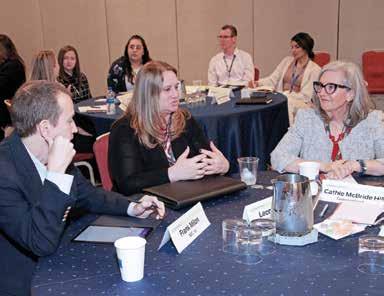


Walmart Health recently announced plans to bring more accessible, convenient, and affordable healthcare to communities in Florida with 16 new health centers. The lo cations will span the metro areas of Jacksonville, Orlando, and Tampa and will open by fall 2023.
“As the population in Florida continues to grow at more than double the rate of the rest of the United States, so does the need to increase access to quality health care,” said Dr. David Carmouche, senior vice president, Omnichannel Care Offerings at Walmart. “With these 16 new Walmart Health centers across the state, even more Floridians will have easy access to a wide range of high-quality health services at convenient hours and easy to understand prices.”
The new state-of-the-art facilities, located beside Walmart Supercenters, will provide a range of healthcare services seven days a week in one convenient location for members of the local community, so they can get the right care at the right time, right in their backyard. These services may vary by location, but include primary care, labs, X-ray and EKG, behavioral health, dental, hearing, select specialty services, and community health.
Walmart Health’s first 6 locations in Florida opened in 2022 and are demonstrating early success in pro viding convenient access to quality care, the company said. Walmart Health is operated by qualified medical professionals, including physicians, nurse practitioners, dentists, behavioral health providers and optometrists.
First launched in 2019, Walmart Health offers pri mary and urgent care, labs, x-ray and diagnostics, behav ioral health, dental, optometry, and hearing services all in one facility located next door to a Walmart Super center. Walmart Health offers omnichannel access to care seven days a week at convenient hours through in-person centers and Walmart Health Virtual Care. As of this fall, Walmart Health has 32 locations in Arkansas, Florida, Georgia, Illinois, and Texas. Additional information can be found by visiting walmarthealth.com. Beginning in January 2023, select Walmart Health centers in Florida and Georgia will also offer comprehensive value-based care to cer tain Medicare Advantage patients, as part of a recent collaboration announcement between Walmart and UnitedHealth Group.
CME announces expansion of its executive team
CME Corp. announced the expansion of its executive team with the addition of Maricar Caressimo, chief human resources officer and Kristen Sisson, chief marketing officer.
“We are very excited to add Kristen and Maricar to the team. Fresh ideas, new skill sets, and increased diversity will enrich our executive team and, ultimately, our company,” said Cindy Juhas, chief strategy officer at CME Corp.
In her role as CHRO, Maricar will lead the devel opment and execution of our organization’s human resources strategy. This includes the implementation
of all HR programs, initiatives, and practices company wide. She has over 20 years of progressive human resources leadership experience across multiple indus tries including pharmaceutical, retail, precious metals and engineering services.
As CMO, Kristen is responsible for developing our marketing strategy and execution aligned to our business growth initiatives. She will also define our ecommerce strategy and lead our web sales and product data man agement teams. Kristen has over 25 years of marketing, channel, and ecommerce experience, building and leading successful teams globally.

“The new additions to our executive team are aligned with the growth and trajectory of our busi ness. We continue to strive to deliver the best possible experience to our customers, no matter the touchpoint. Adding marketing and HR to our executive team will help us continue to scale our business to meet the demands of our customers and the healthcare industry,” Normand Chevrette, CEO and President of CME Corp.
McKesson opens its most technologically ad vanced healthcare distribution center in Ohio
McKesson Corporation has opened a new state-of-theart pharmaceutical distribution center in Jeffersonville, Ohio, centrally located between Cincinnati and Colum bus. The new facility will distribute pharmaceutical, overthe-counter (OTC) and home healthcare (HHC) products as well as consumer packaged goods (CPG) to customers across Ohio, Indiana, Kentucky, Michigan, Pennsylvania and West Virginia.
Set on approximately 40 acres, the 475,000-squarefoot facility houses the most advanced automation in supply chain technology that will optimize efficiency and productivity to provide exceptional service to customers. The Central Ohio distribution center can process double the amount of volume compared to McKesson’s current largest distribution center. Strate gically located to serve customers across the region, the facility is fitted with automated putaway, replenish ment and order filling processes as well as a tote washer and robotic palletizer to handle volume increases and growth over time.
By automating redundancies and labor-intensive tasks, McKesson employees are able to focus on more fulfilling tasks that have a more direct impact on customer orders. The space was also thoughtfully designed with employee wellness in mind, featuring high-bay windows for natural light, increased capacity for training rooms, and a walking trail around the property’s pond.
In addition to distribution technologies and efficiencies, this center also includes several sustainability attributes, such as:
ʯ
Roof structure designed to accommodate future solar panels
BD achieves ISO certification for its enterprise-level ISMS
BD announced its enterprise-level Information Security Management System (ISMS) has been certified to a rigorous set of independently audited international standards for information security, further demonstrating the compa ny’s ongoing commitment to protecting BD, its custom ers and patients from cybersecurity risks.
ISO/IEC 27001:2022 is a globally recognized set of inormation security standards established by the Inter national Standards Organization (ISO) and the Interna tional Electrotechnical Commission (IEC). Certification provides assurance that an organization conforms with specific requirements for managing information security, including establishing, implementing, maintaining and continually improving its Information Security Manage ment System (ISMS).
“Cybersecurity continues to be a top priority for Merck and all of health care,” said Michael Harrison, associate director of supplier risk management for Merck. “As an important supplier to Merck, BD’s ISO 27001 cer tification demonstrates it is aligned with Merck’s cyberse curity priorities and is committed to maintaining a cyber security program designed to protect medical devices, hospitals and patients.”
ISO/IEC 27001:2022 standards also include require ments for assessing and addressing information secu rity risks. During the two-stage external audit process, auditors verified the company’s Information Security policies, Statement of Applicability (SoA) and Risk Treat ment Plan (RTP) to certify that BD meets ISO/IEC 27001:2022 requirements.
“ISO 27001 certification provides fundamental assur ance for customers that BD meets rigorous international standards for managing information security, including protected health information and personal identifiable information,” said Rob Suarez, chief information security officer for BD. “This distinction validates that our sys tem for managing information security is appropriately designed and implemented, which is especially critical as regulatory demands for effective cybersecurity controls increase around the world.”
ʯ
ʯ
Electric car charging stations
LED lighting inside and outside
ʯ Low-flow plumbing fixtures
ʯ Motion sensors to reduce unnecessary water and electricity usage
The Owens & Minor Foundation announced a dona tion of $100,000 to the National Association of Free and Charitable Clinics (NAFC), a non-profit organiza tion dedicated to ensuring that the medically underserved
have access to affordable quality healthcare. The donation was presented at NAFC’s annual Charitable Healthcare Symposium by Dan Starck, EVP and President of Patient Direct for Owens & Minor and CEO of Apria.
“We deeply value the support of like-minded partners such as the Owens & Minor Foundation that are committed to the benefits of a community-based approach in improving access to healthcare,” commented Nicole Lamoureux, President, and CEO of the National Asso ciation for Free and Charitable Clinics. “This contribution will help NAFC continue providing the vital support our member clinics and pharmacies rely on to deliver patient care to those in need.”
The NAFC represents more than 1,400 free and charitable clinics and pharmacies across the United States that serve as safety nets for uninsured and under insured people who may not otherwise have access healthcare, regardless of the patient’s ability to pay. Health clinics and pharmacies affiliated with NAFC are 501(c)(3) organizations that provide a range of medi cal, dental, pharmacy, vision and/or behavioral health services and utilize a primarily volunteer-based service model to administer patient care. In 2021, NAFC clin ics and pharmacies delivered care to approximately 1.8M patients nationwide.
“We’re proud to support an organization like the NAFC, which has a mission so closely aligned with our own,” said Faith Cristol, President, Owens & Minor Foundation. “Helping to build healthier communities and creating possibilities for people to lead healthier lives is an essential part of the focus for the Owens & Minor Foundation and builds on Owens & Minor’s longstanding legacy of service.”
The donation will be used for NAFC programming and to create health equity scholarship opportunities for members to participate in NAFC activities. Earlier this year, the Owens & Minor Foundation contributed $10,000 to NAFC to help clinics in Florida impacted by Hurricane Ian.
Health o meter Professional Scales, Ceiba Healthcare announce collaboration to bring state-of-the-art EMR integration to customers
Pelstar LLC, manufacturer of Health o meter® Professional Scales, and Ceiba Healthcare announce a strategic col laboration that allows customers to access true stateof-the-art EMR integration technologies for their patient weight data. “As the North American leader in patient weighing products, and EMR connected scales,
Health o meter® Professional has been producing EMR compatible scales for more than 15 years” says Scott Gottman, Director of Product Management and Business Development at Pelstar.
“We’re pleased to collaborate with Pelstar to bring Ceiba Healthcare’s device-agnostic IoMT interoperability to Health o meter® Professional Scale customers looking to integrate their weight and height measurements into their EHR system. Adding Health o meter® Professional products to the 1,000+ devices already supported by Ceiba Healthcare, brings true HL7 Fast Hospital Interop erability Resource (FHIR) data encryption to their inte gration initiatives” says Brett Busse, Director of Business Development for Ceiba Healthcare.
Ceiba Healthcare’s IoMT eConnect Box and Cloud platform allow customers to swiftly and securely inte grate both their existing and new Health o meter® Profes sional scales to 20+ EHRs or third-party systems. Ceiba’s proprietary technologies allows system implementation to be completed in less than three days with minimal IT support. Coupled with Ceiba’s 24/7 worldwide sup port, health systems can now easily integrate their patient weighing products and more than 1,000 other medical devices with their EHR systems.
Former Fortune 500 healthcare executive joins AliMed as SVP of Commercial Growth and Development
AliMed has announced that Jeff Hastings has joined its Senior Leadership Team as the Senior Vice President of Commercial Growth and Development.
In his new role, Hastings will lead AliMed’s national sales and sales support teams, spearheading commercial expansion of its product portfolio to strengthen the company’s position and market share in both the acute and post-acute care space. Addition ally, Hastings will drive efforts to develop and execute programs with preferred suppliers, build on core con tract positions within the GPO, federal government, and healthcare-provider segments, and enhance the customer experience.
“Jeff has relentlessly proven over his more than 20 years in healthcare leadership to be a key cog in some very critical and highly strategic endeavors,” said Adam S. Epstein, CEO of AliMed. “He is superbly skilled at developing and leading high-performing sales teams with a track record for elevating companies to the next level. We are very excited to welcome Jeff and his talents to our team.”
As an influential senior executive in the healthcare industry, Hastings brings decades of leadership experience to AliMed. He has led major corporate initiatives focused on strategic transformation, portfolio diversification, and revenue acceleration for long-term sustainability at some of the nation’s largest healthcare organizations, includ ing Owens and Minor, Cardinal Health, Hill-Rom, Roche
Diagnostics, and Vizient (formerly MedAssets). Most recently, Hastings was operating partner at Mountain Pacific Fund, a life sciences investment firm based in Salt Lake City.
A native of Ohio, Hastings holds a master’s degree in Education from the University of Akron and a bachelor’s degree in Sports Medicine and Health Education from Ashland University.
Statement of Ownership, Management, and Circulation PS Form 3526-R
1. Publication Title: Repertoire 2. Publication Number: 1520-7587 3. Filing Date: 11/01/2022 4. Issue Frequency: Monthly
Number of Issues Published Annually: 12 6. Annual Subscription Price: $49.00 US, $59.00 Canada 7. Office of Publication: 1735 N Brown Rd Ste 140 / Lawrenceville, GA 30043-8153
Contact Person: Laura Gantert 770-416-0071
8. General Business Office: 1735 N Brown Rd Ste 140 / Lawrenceville, GA 30043-8153 9. Publisher: Scott Adams / 1735 N Brown Rd Ste 140 / Lawrenceville, GA 30043-8153
Editor: Graham Garrison / 1735 N Brown Rd Ste 140 / Lawrenceville, GA 30043-8153
Managing Editor: Graham Garrison / 1735 N Brown Rd Ste 140 / Lawrenceville, GA 30043-8153 10. Owner: John Pritchard / 1735 N Brown Rd Ste 140 / Lawrenceville, GA 30043-8153 11. Known Bondholders, Mortgagees, and Other Security Holders Owning or Holding 1Percent or More of Total Amount of Bonds, Mortgages, or Other Securities: None 12. n/a 13. Publication Title: Repertoire
Extent and Nature of Circulation:
I certify that all information furnished on this form is true and complete. I understand that anyone who furnishes false or misleading information on this form or who omits material or information requested on the form may be subject to criminal sanctions (including fines and imprisonment) and/or civil sanctions (including civil penalties)
Set the stage for better care and set yourself apart with this Midmark approach.

We designed the only fully integrated point of care ecosystem to help promote a more consistently accurate blood pressure measurement by targeting 3 key areas













Patient positioning during blood pressure (BP) capture can impact the accuracy of BP measurements. The American Medical Association (AMA) recommends the patient’s back be supported, feel flat on the floor, legs uncrossed and arm supported at heart height. 1



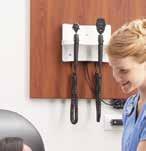

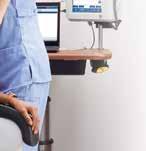
Automation at the point of care that can help ensure a higher level of standardization, minimizing human variables while maximizing consistency and data accuracy.
Seamless connectivity to the EMR saves time and reduces the likelihood of data transcription errors.

